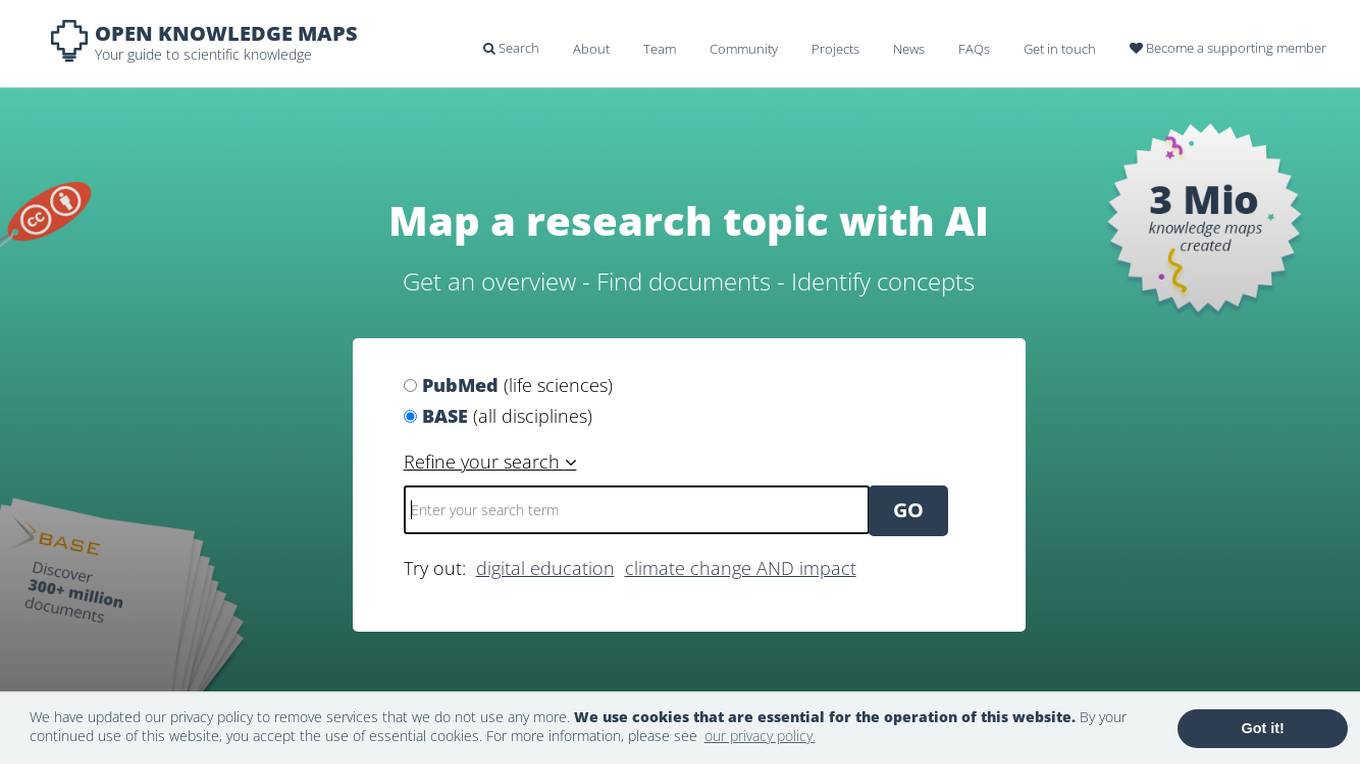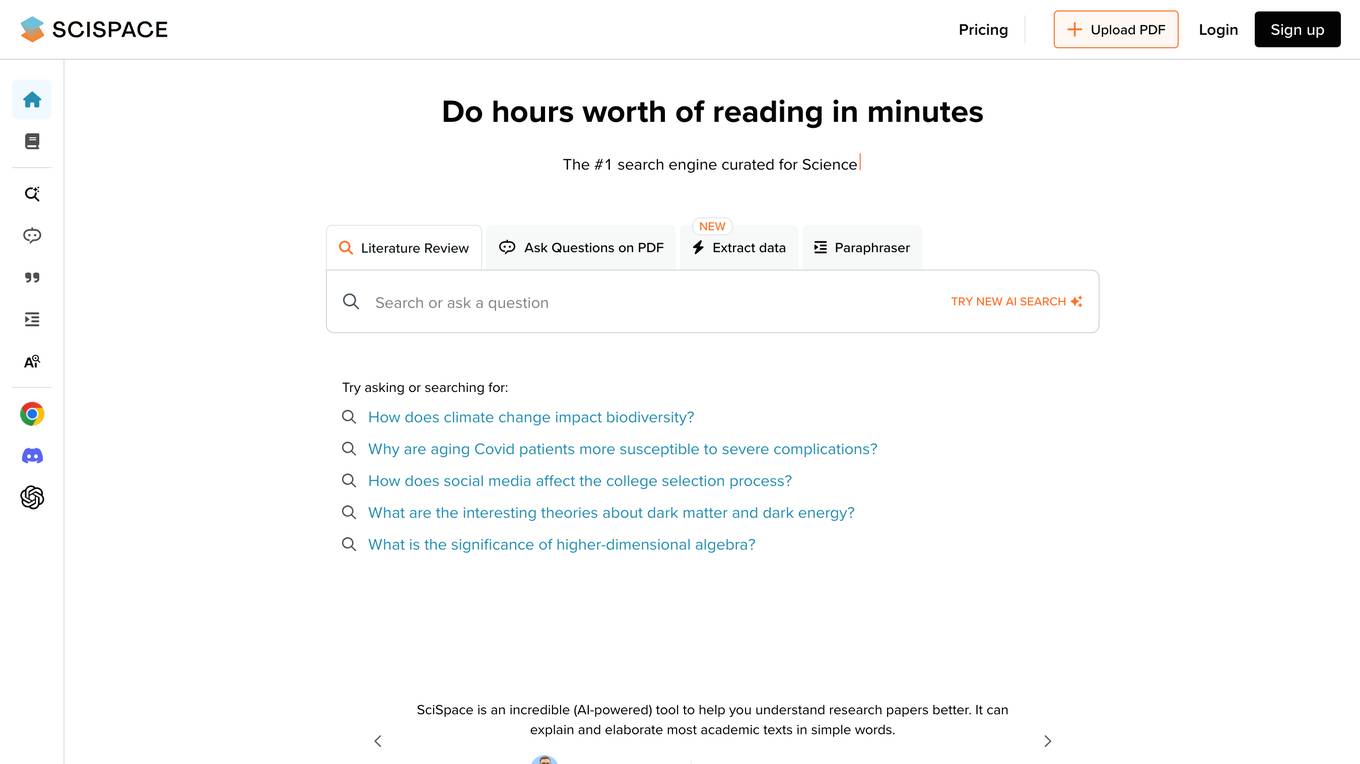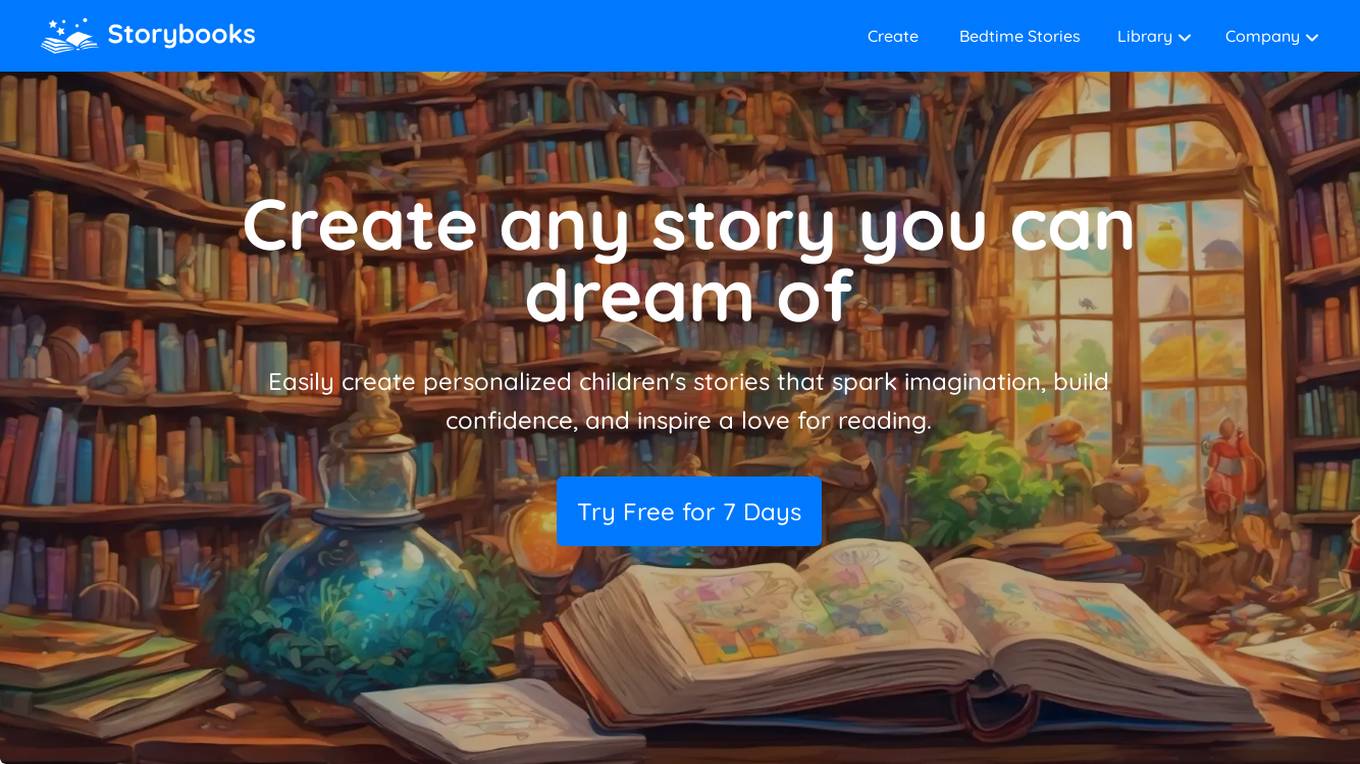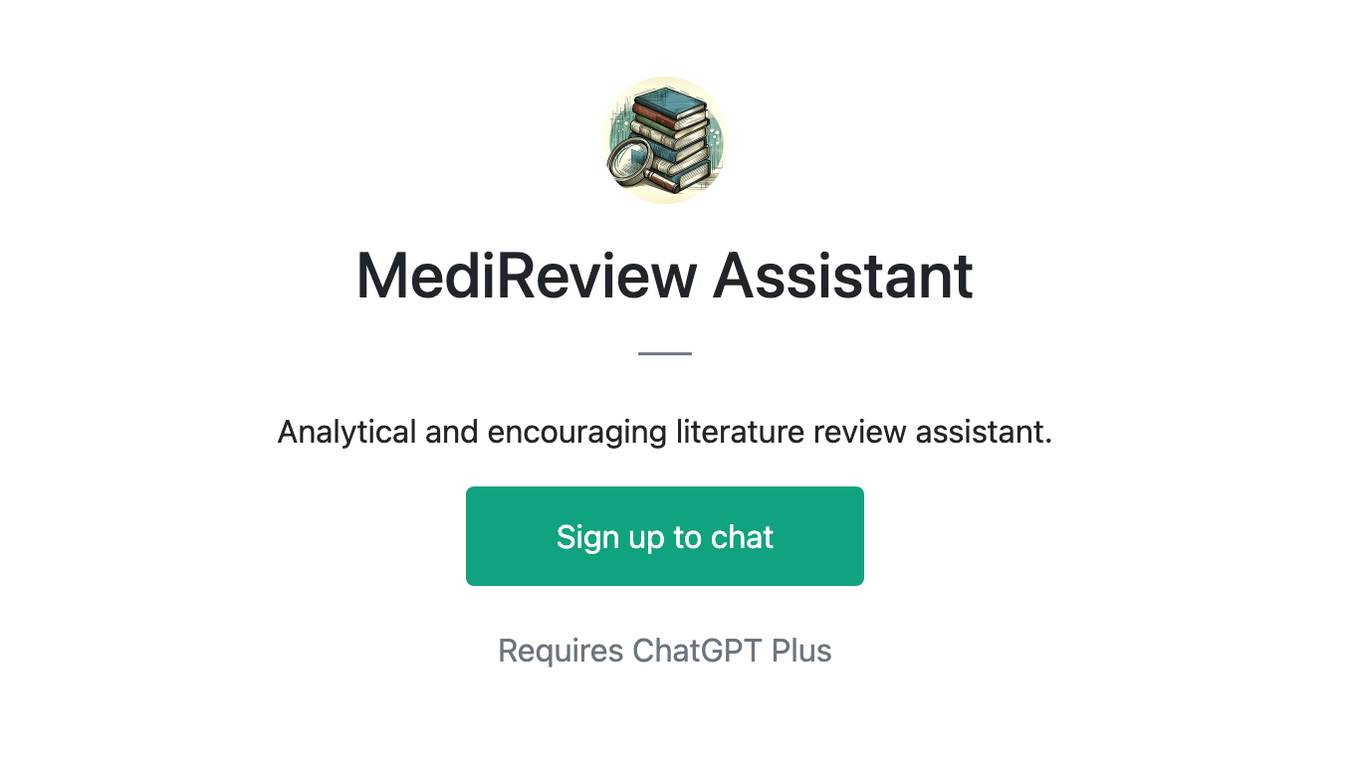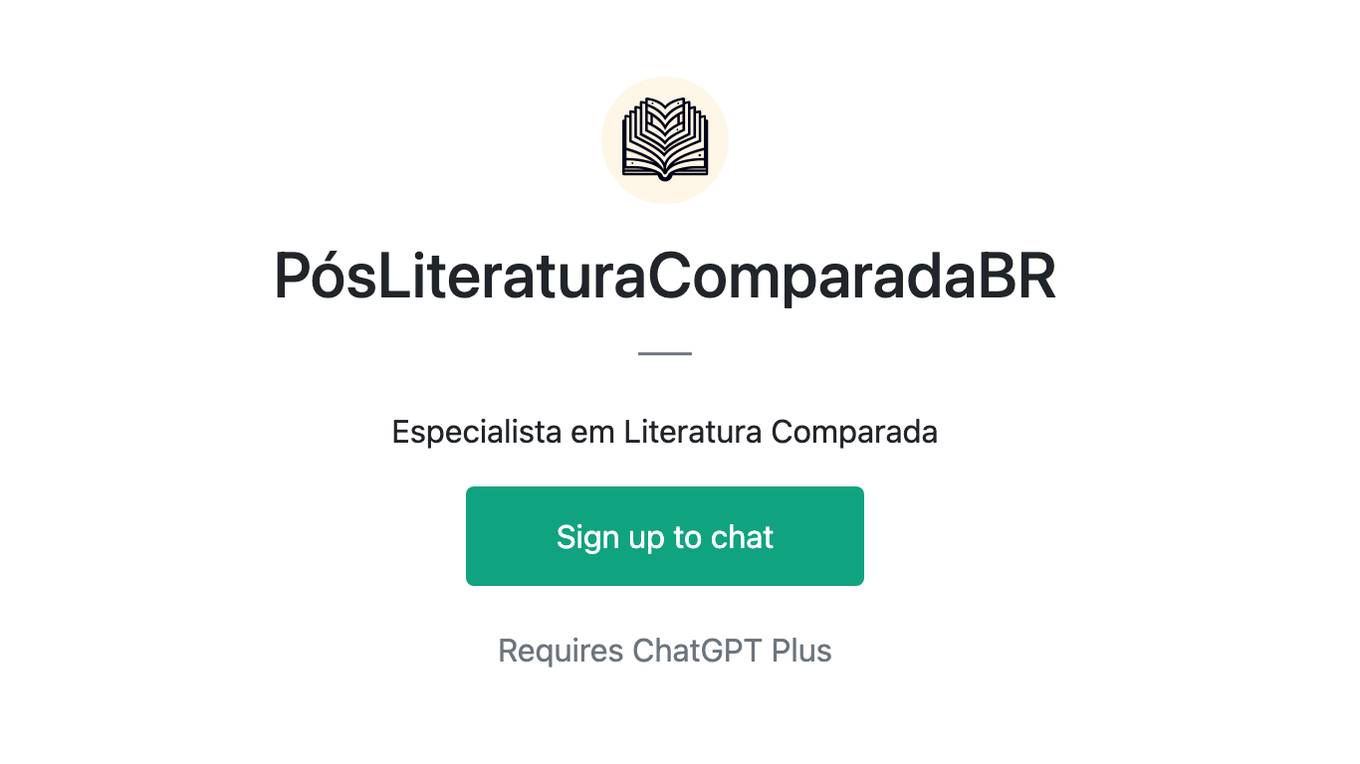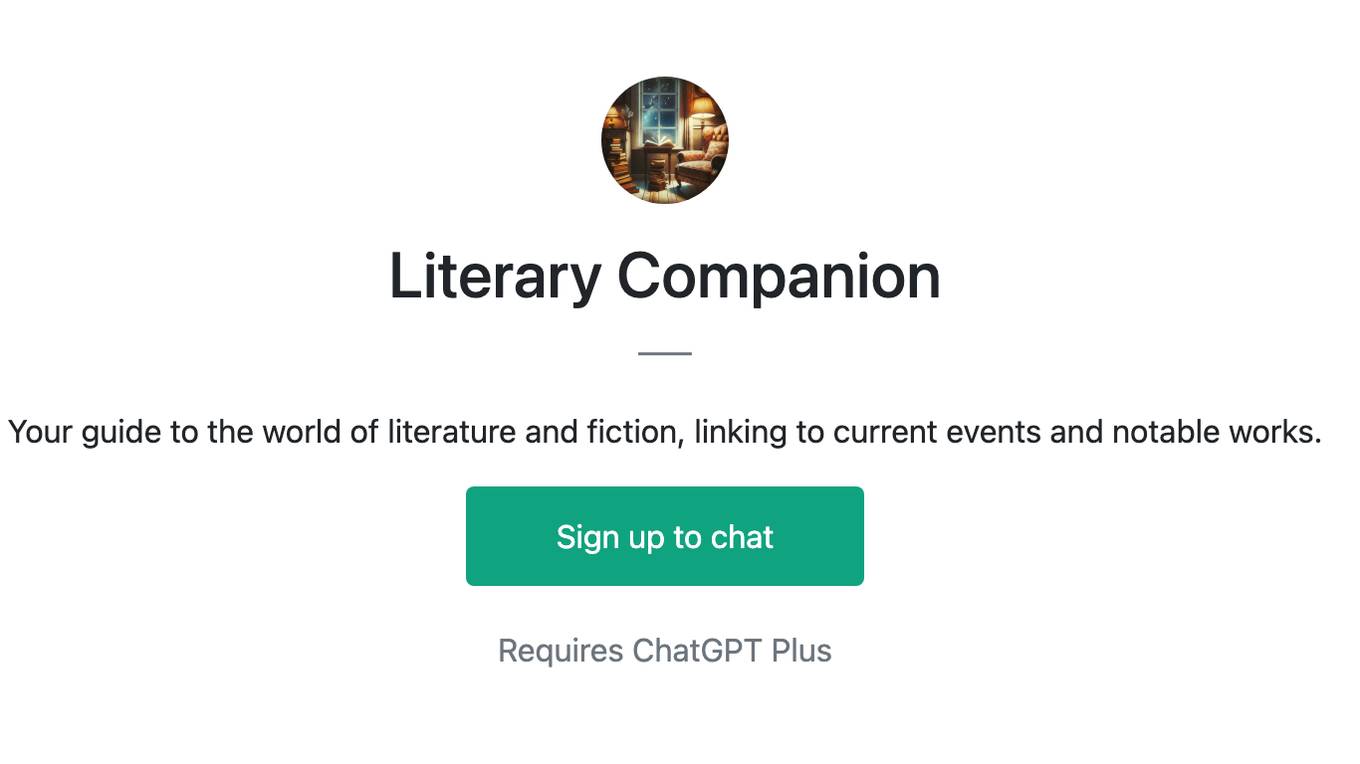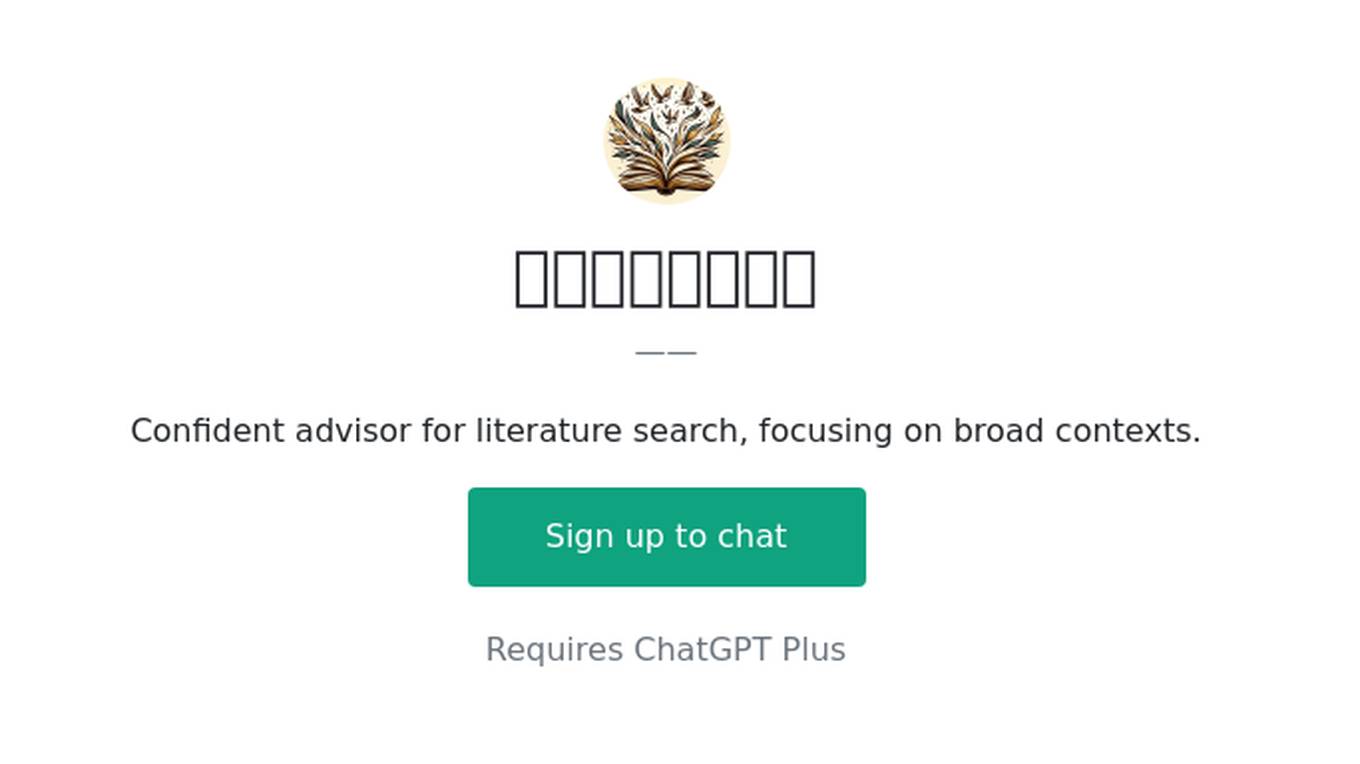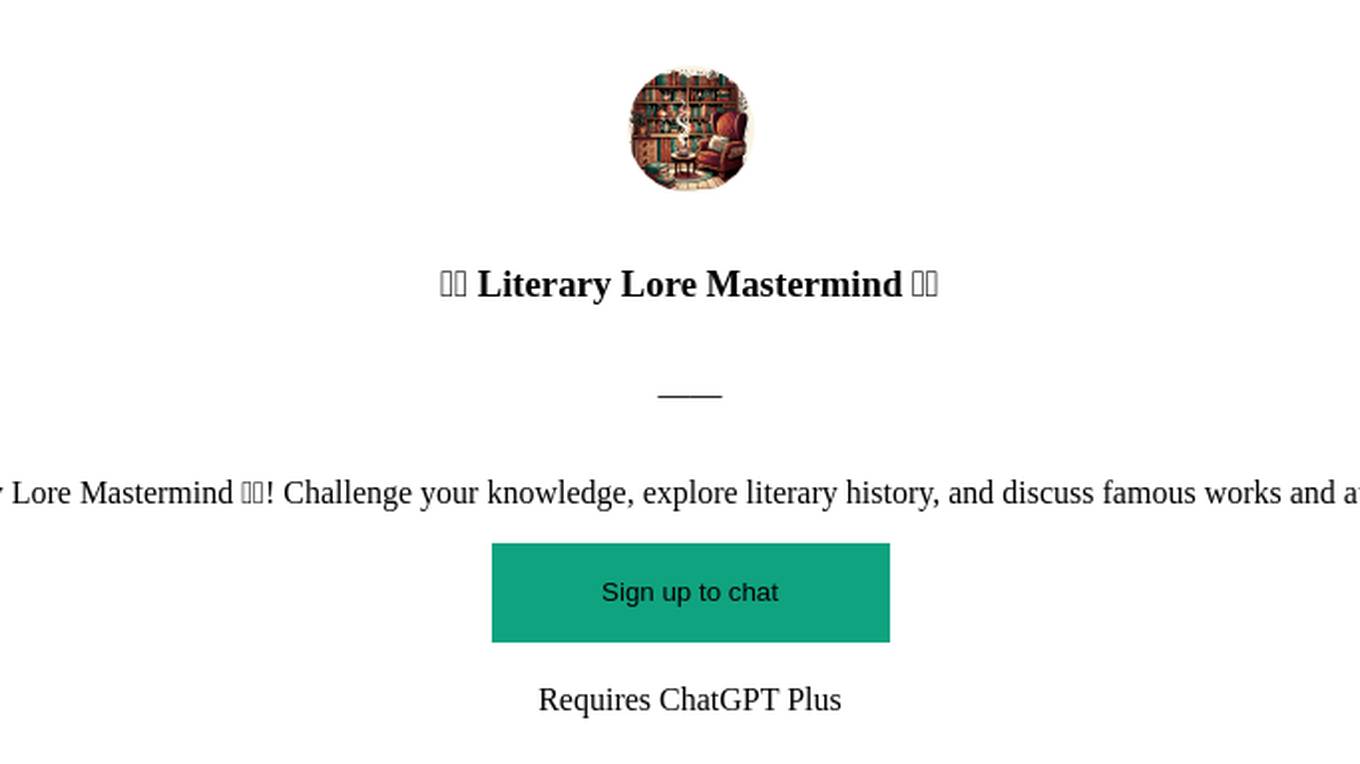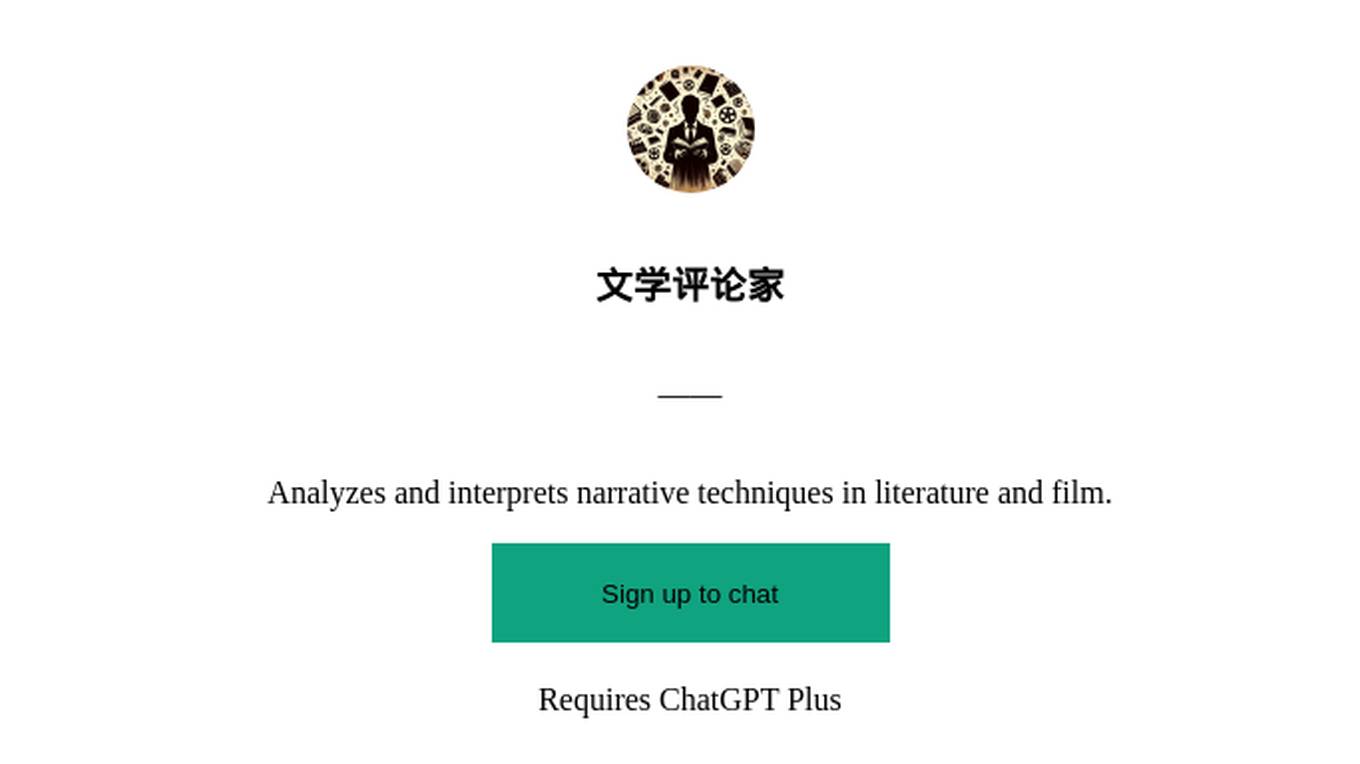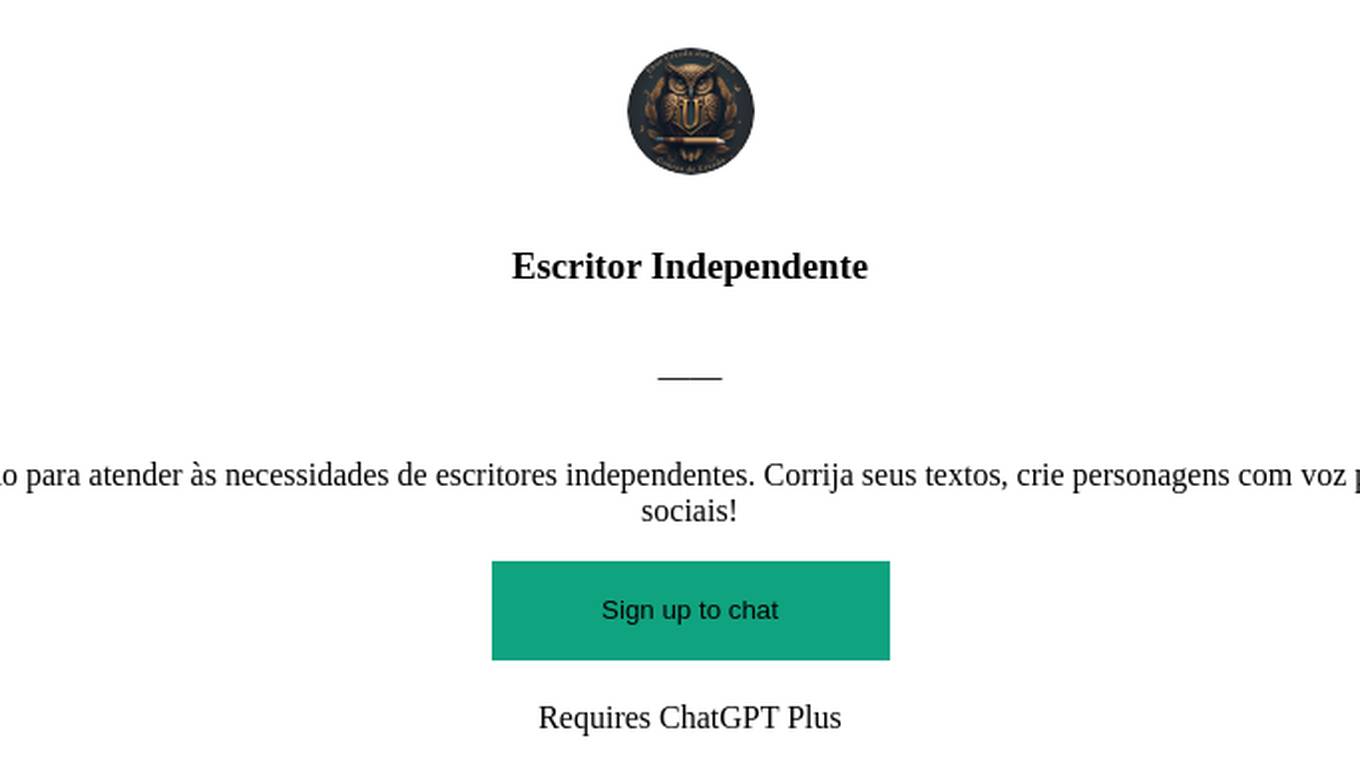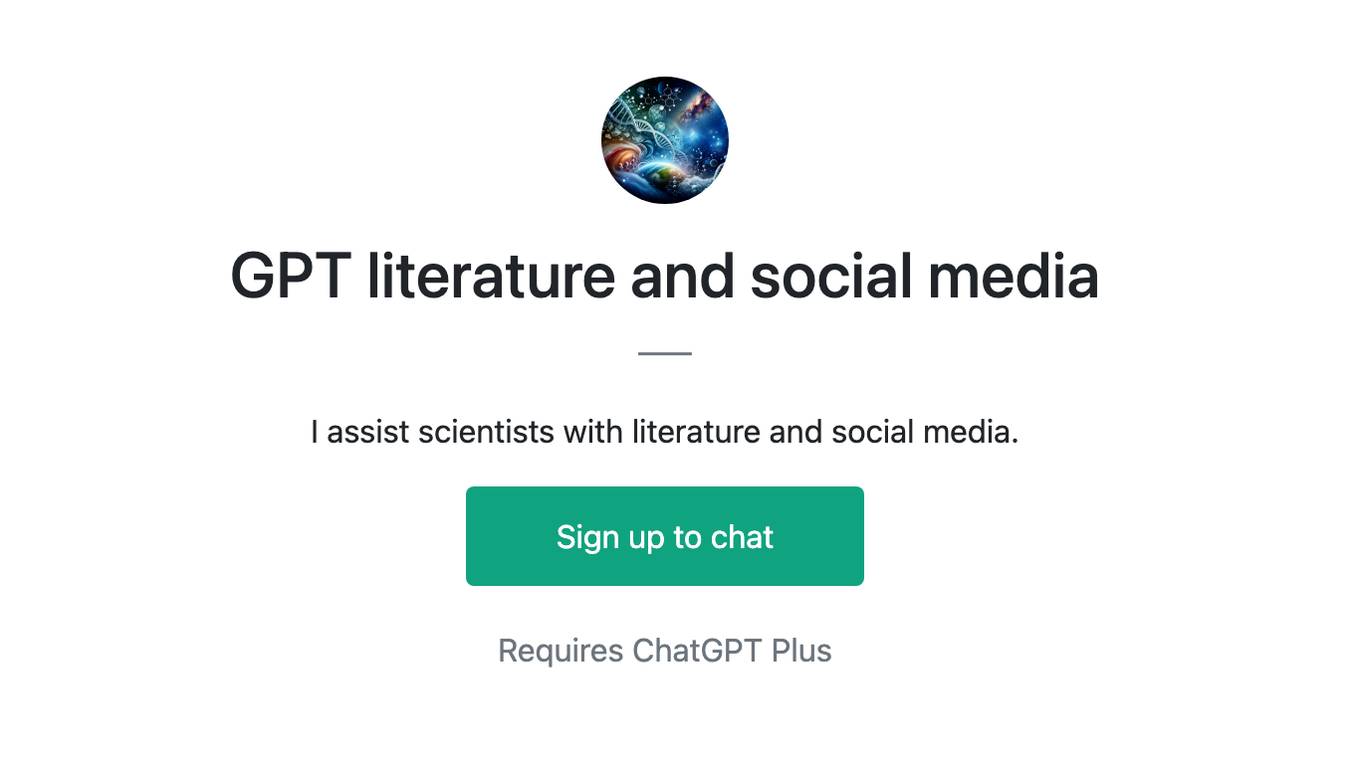AI tools for litero
Related Tools:
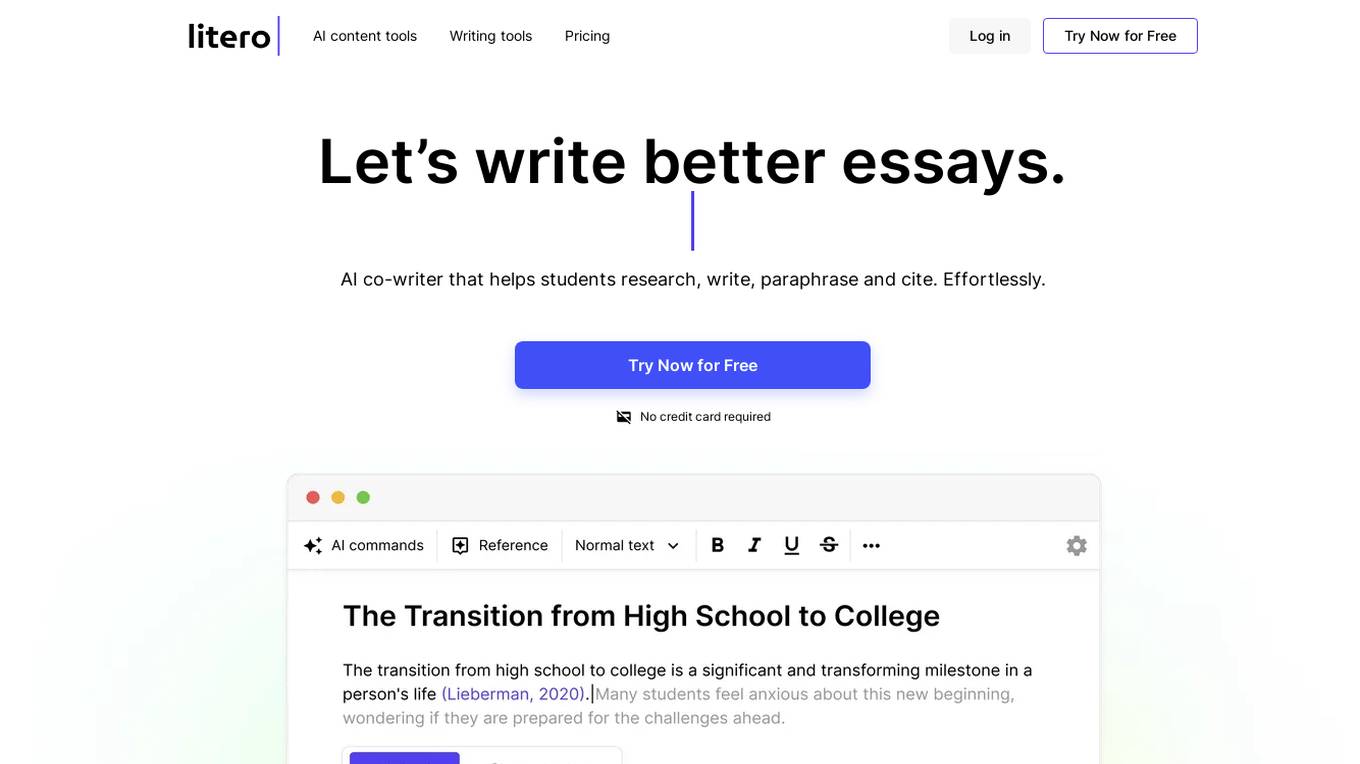
Litero
Litero is an AI-powered writing assistant designed specifically for students. It offers a range of tools to help students with their writing tasks, including an outline generator, AI autosuggest, citation tool, and built-in ChatGPT integration. Litero is easy to use and can help students save time and improve their writing skills.

Litera
Litera is a legal technology solutions provider offering a wide range of software tools to streamline contract and document creation, review, analysis, and management for law firms. The platform also focuses on enhancing firm performance, governance, and productivity through innovative legal AI solutions. With a strong emphasis on knowledge management, marketing, finance, talent management, and security, Litera aims to empower legal professionals with cutting-edge technology to amplify their impact and deliver exceptional client service.
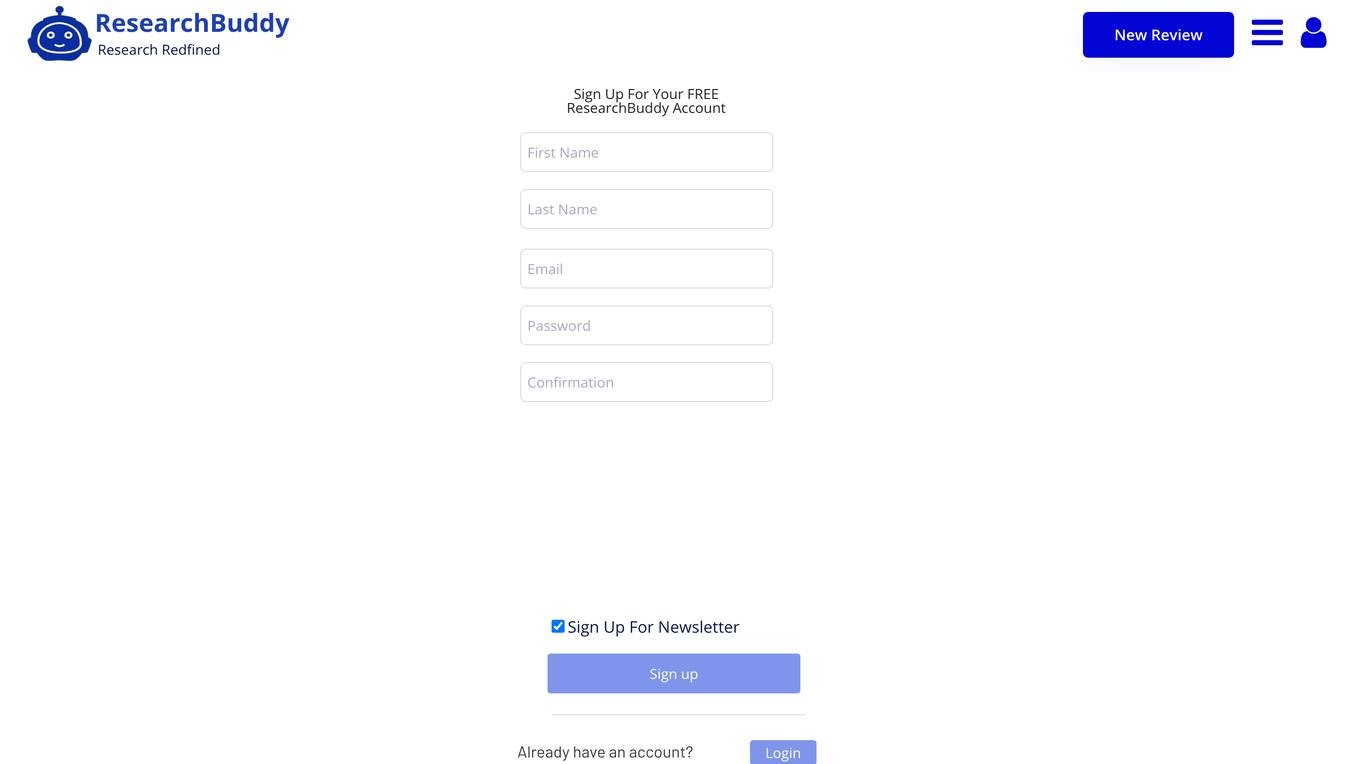
ResearchBuddy
ResearchBuddy is an AI tool designed to automate the process of conducting literature reviews. It helps researchers and students efficiently gather and analyze information from various sources to enhance their research projects. By leveraging artificial intelligence, ResearchBuddy streamlines the review process, saving users time and effort. The platform offers a user-friendly interface and advanced algorithms to deliver accurate and relevant results. With ResearchBuddy, users can access a comprehensive database of scholarly articles and publications, making it easier to stay up-to-date with the latest research trends and findings.

DrugCard
DrugCard is an AI-enabled Data Intelligence platform designed to streamline drug safety routines. It offers solutions for pharmacovigilance by providing services such as local literature screening, regulatory intelligence, adverse event database, and eCTDlight services. The platform supports multiple languages, covers medical journals from over 100 countries, and saves up to 60% of time compared to manual approaches. DrugCard aims to enhance pharmacovigilance processes by leveraging AI, automation, and traceability.
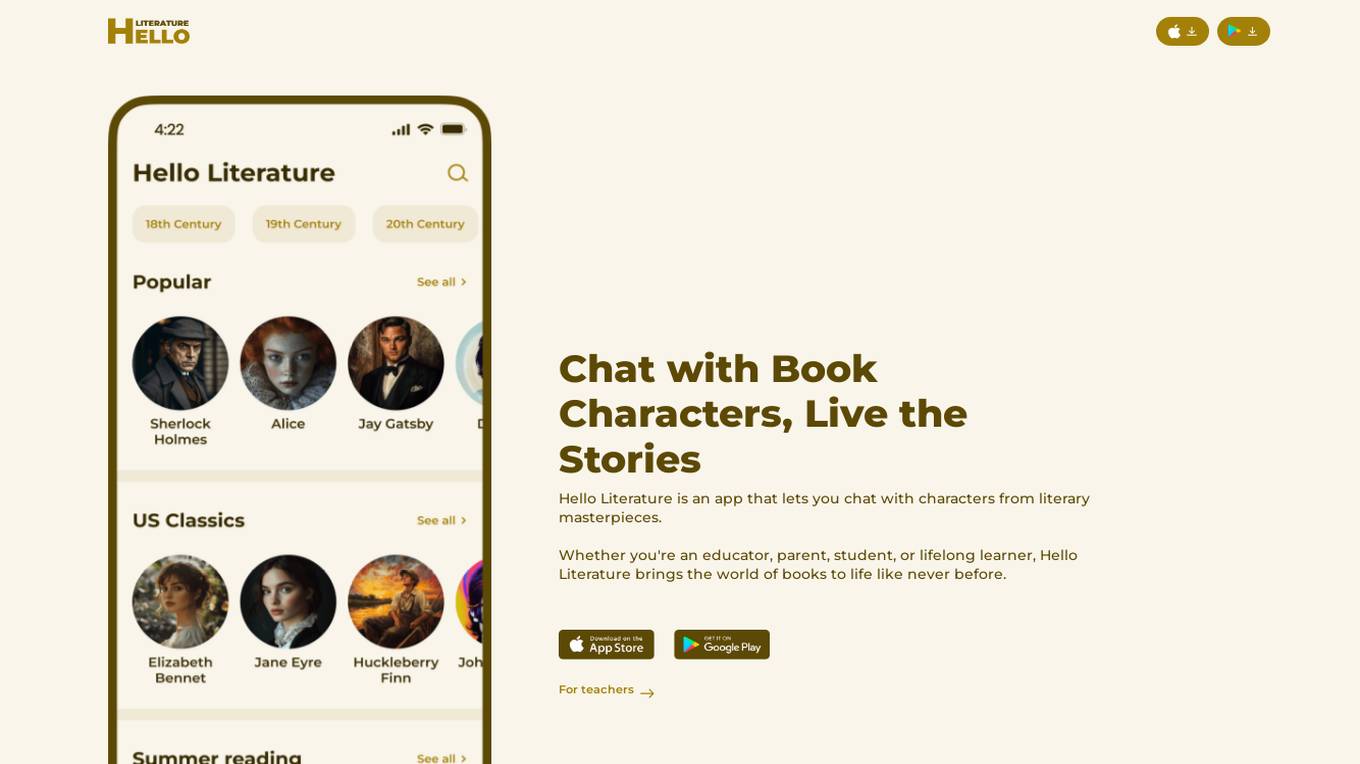
Hello Literature
Hello Literature is an AI-powered application that allows users to chat with characters from literary masterpieces. It caters to educators, parents, students, and lifelong learners, providing an immersive and interactive experience with fictional characters. The app supports project-based learning, enhances critical thinking, and fosters discussion to make literature classes more dynamic and engaging. With realistic voice generation, Hello Literature brings the world of books to life like never before, transforming screen time into educational time for children and offering a unique dimension of literature exploration for enthusiasts and learners.
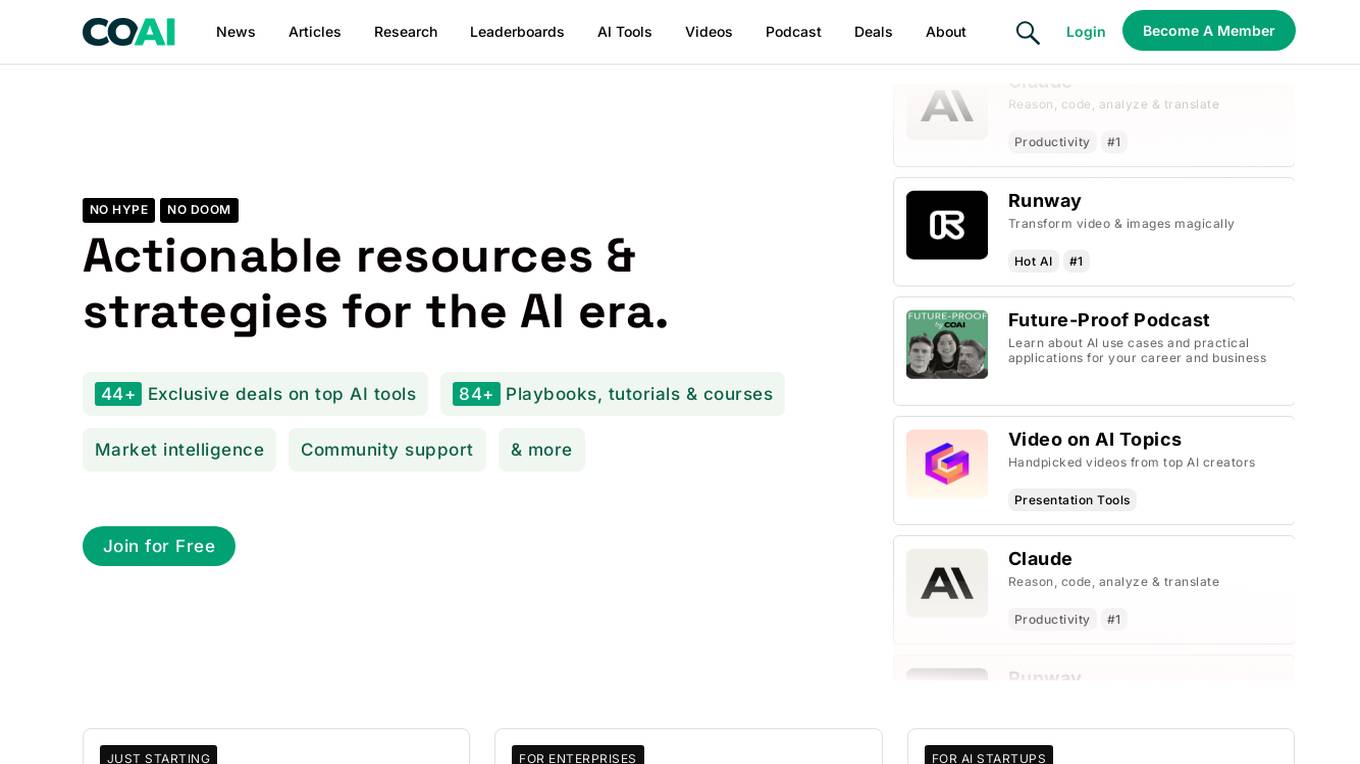
CO/AI
CO/AI is an AI Literacy Community & Marketplace that provides actionable resources and strategies for the AI era. It offers exclusive deals on top AI tools, playbooks, tutorials, courses, market intelligence, and community support. The platform aims to empower individuals and businesses with the knowledge and tools needed to thrive in the age of AI.
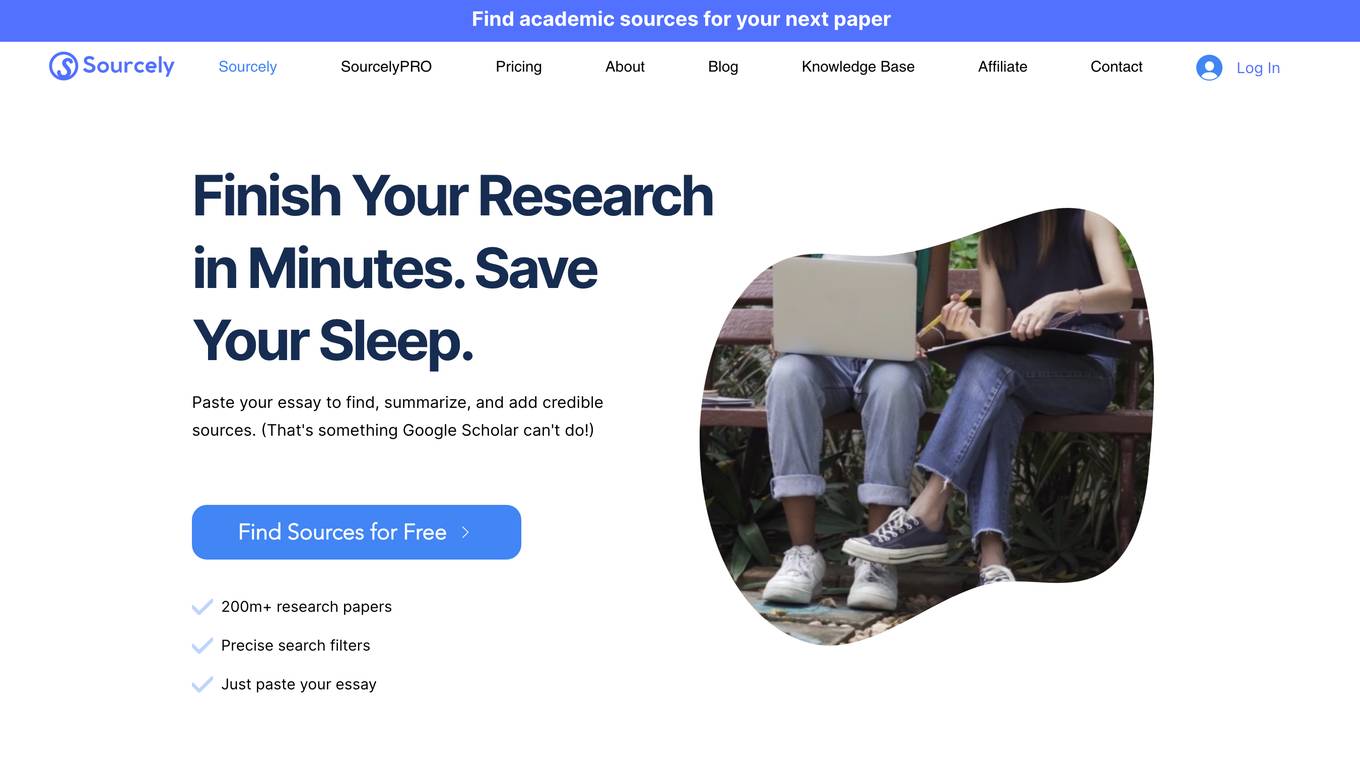
Sourcely
Sourcely is an AI-powered academic search assistant designed to help users find, summarize, and add credible academic sources efficiently. With access to over 200 million research papers and advanced search filters, Sourcely streamlines the research process by finding sources, summarizing them, and exporting citations instantly. It offers features such as advanced citation tools, precise search filters, targeted citations, free PDF downloads, citations library, credible summaries, and export references in various formats. Sourcely is a valuable tool for researchers, students, and professionals looking to enhance the quality of their work and save time in sourcing and referencing.

Shooketh
Shooketh is an AI bot that is fine-tuned on Shakespeare's literary works. It is built with the Vercel AI SDK and utilizes OpenAI GPT-3.5-turbo. Users can learn how to build their own bot like Shooketh by reading the provided guide. The bot can engage in conversations and provide insights inspired by Shakespeare's writings.
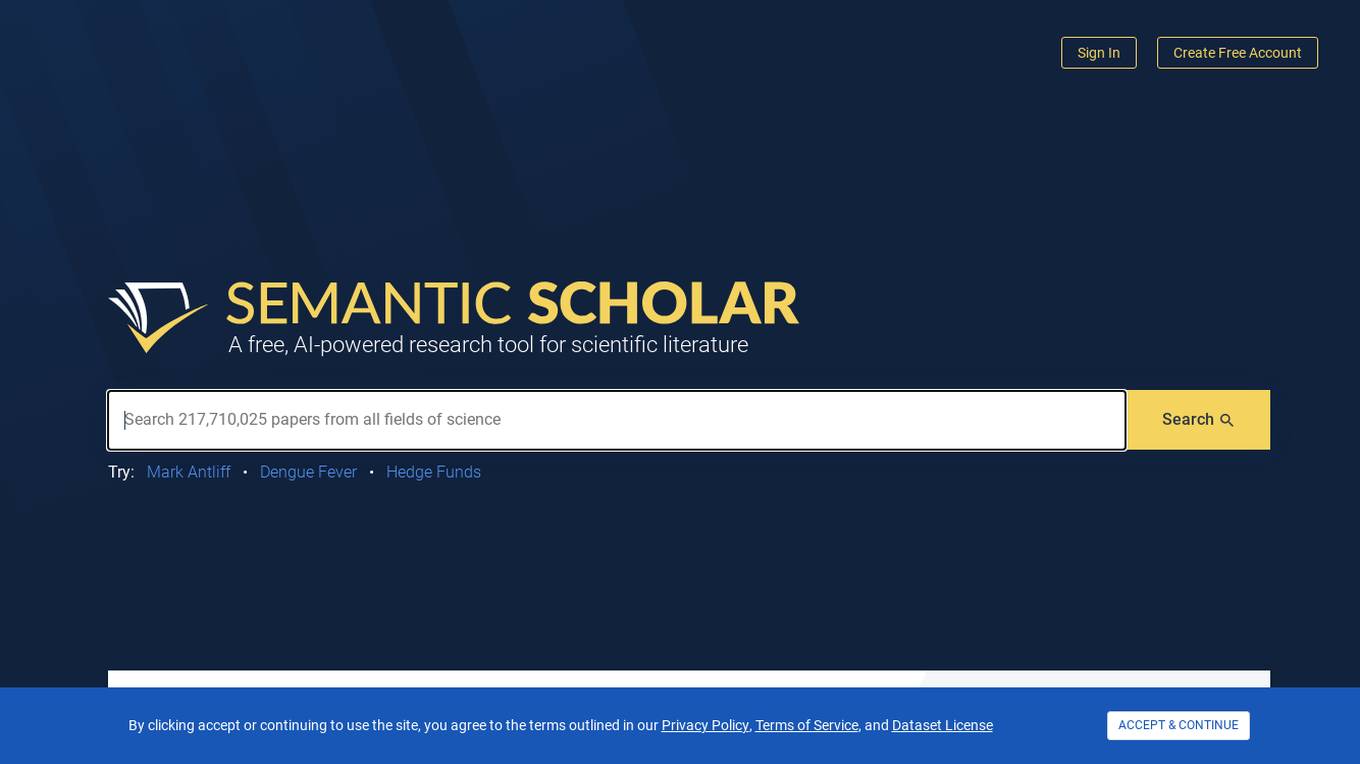
Semantic Scholar
Semantic Scholar is a free, AI-powered research tool for scientific literature. It is based at the Allen Institute for AI and provides access to over 217 million papers from all fields of science. Semantic Scholar uses AI to help users discover and explore scientific literature, and to stay up-to-date on the latest research. The tool also includes a number of features to help users manage their research, such as the ability to save papers, create bibliographies, and share research with others.
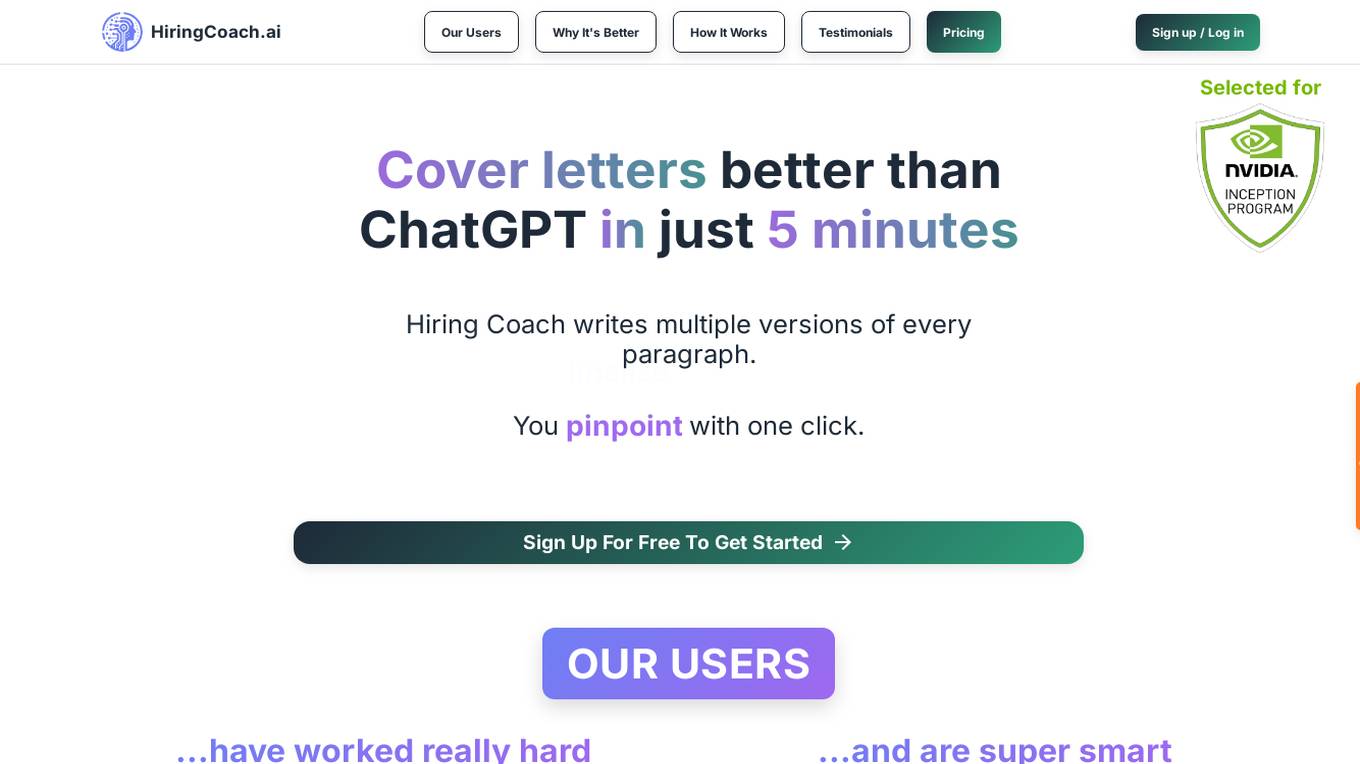
HiringCoach.ai
HiringCoach.ai is an AI-powered job search coach that helps users create tailored cover letters by generating multiple versions of paragraphs, emphasizing critical skills, and optimizing for both human and ATS readers. Users can upload their resume and job description to receive a personalized cover letter draft and refine it with the help of the AI coach. The platform offers flexible export options and aims to make the cover letter writing process effortless and impactful for job seekers.
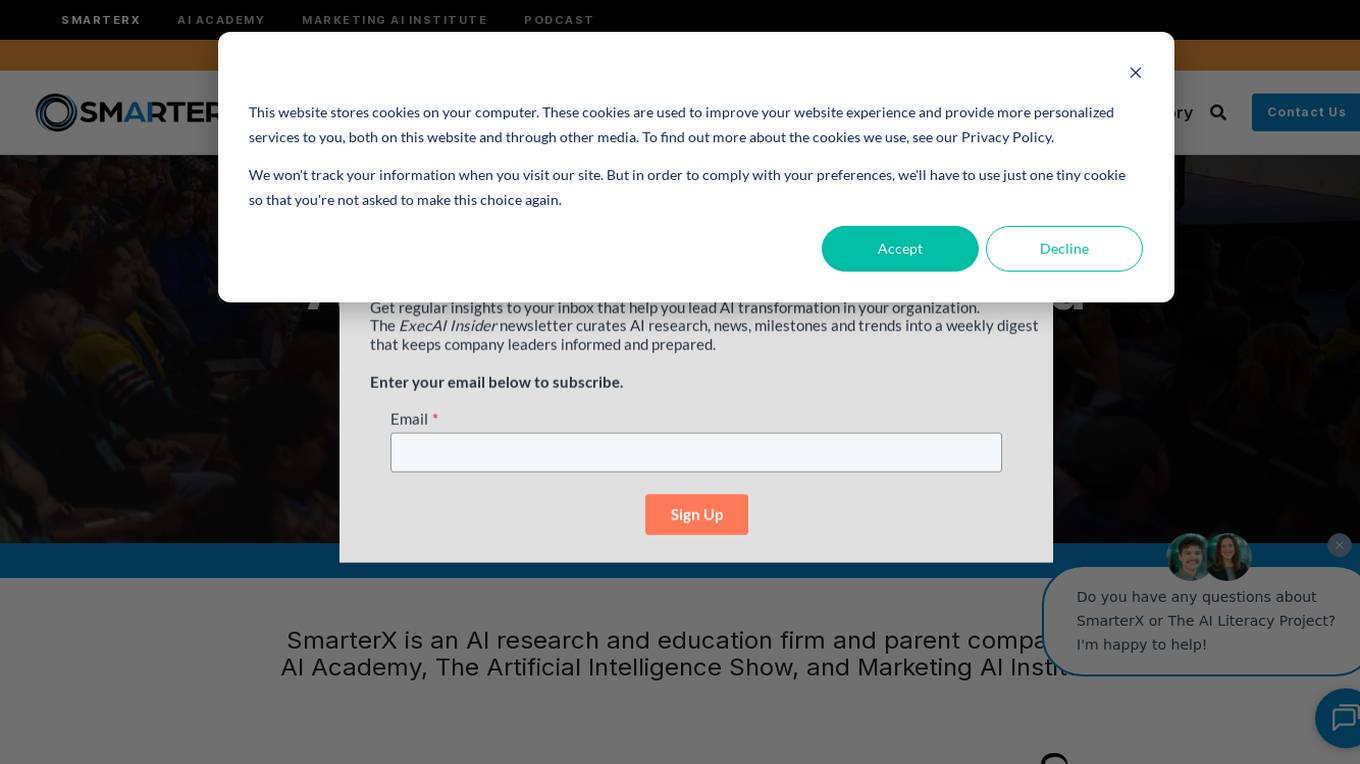
SmarterX
SmarterX is an AI research and education firm that aims to empower leaders to reimagine business models, reinvent industries, and rethink possibilities through a responsible, human-centered approach to AI. The company offers AI Academy, The Artificial Intelligence Show, and Marketing AI Institute to educate professionals and organizations on the transformative power of AI in businesses, industries, jobs, economy, educational systems, and society. SmarterX believes in accelerating AI literacy for all to build a smarter version of any business and prepare for an AI-native future.

Readingclub.ai
Readingclub.ai is an AI-powered platform that transforms bedtime stories into interactive adventures, bringing children's imaginations to life. With the help of AI, the platform provides suggestions for story development, illustrations, and character creation, allowing children to actively participate in the storytelling process and fostering their creativity and literacy skills.
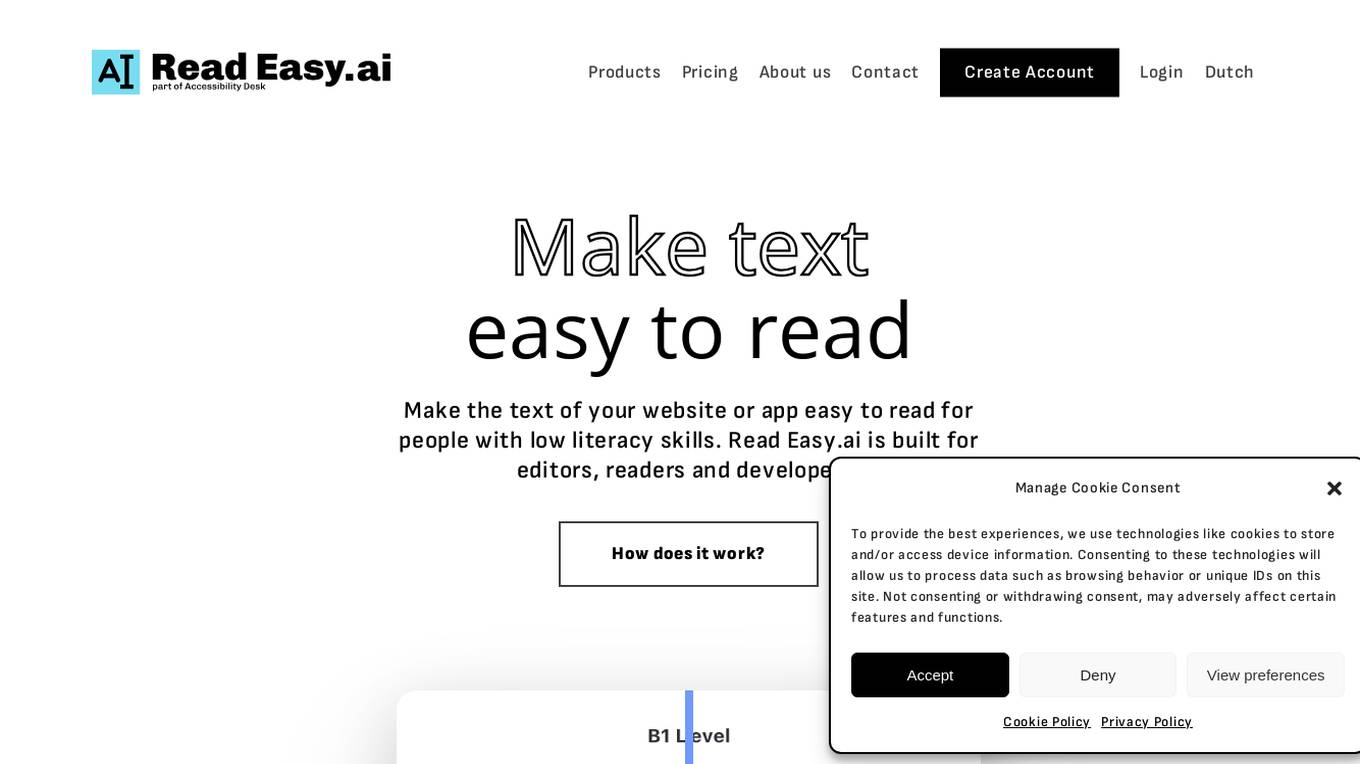
Read Easy.ai
Read Easy.ai is an AI tool designed to make text easy to read for individuals with low literacy skills. It offers powerful tools for editors, readers, and developers to enhance readability and inclusivity. With features like Microsoft Office Add-ins, Chrome Extension, and Developer API, Read Easy.ai aims to improve text comprehension and accessibility for diverse audiences across multiple languages.
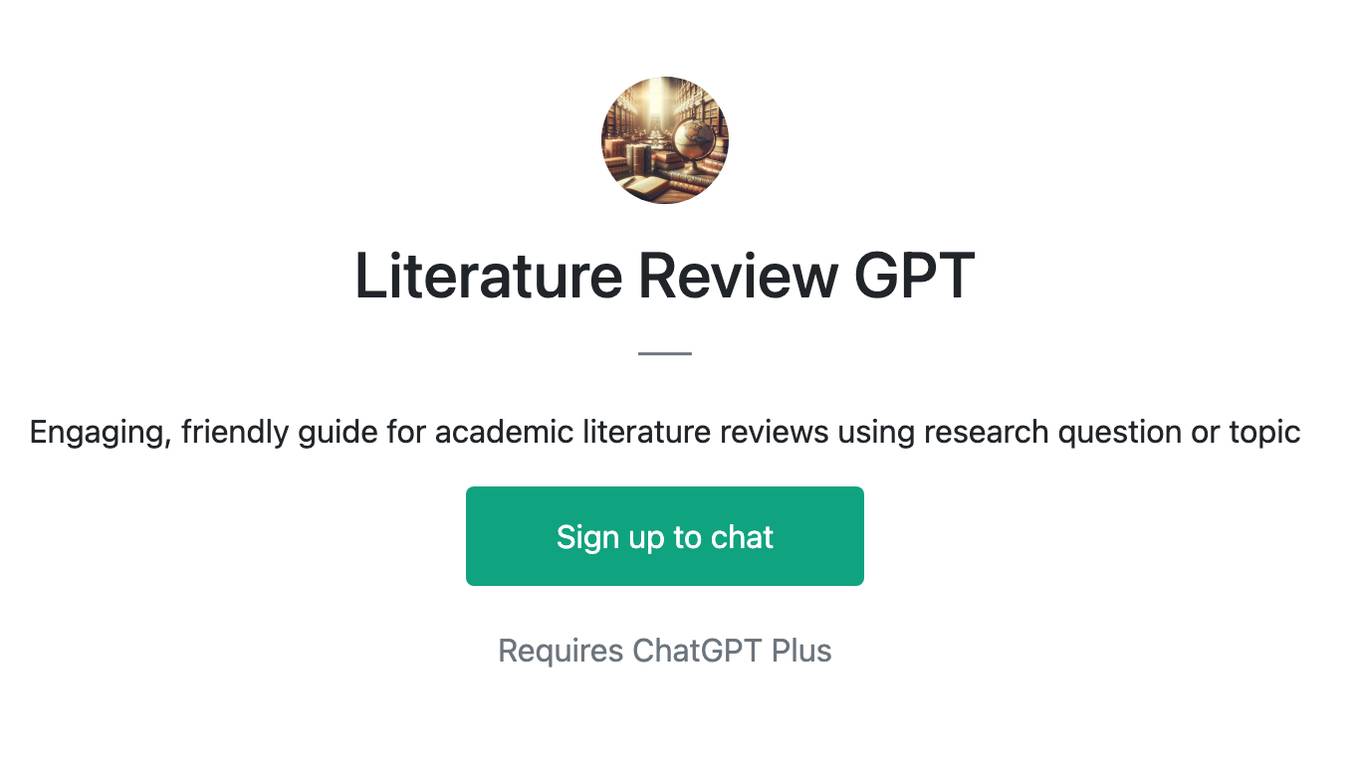
Literature Review GPT
Engaging, friendly guide for academic literature reviews using research question or topic
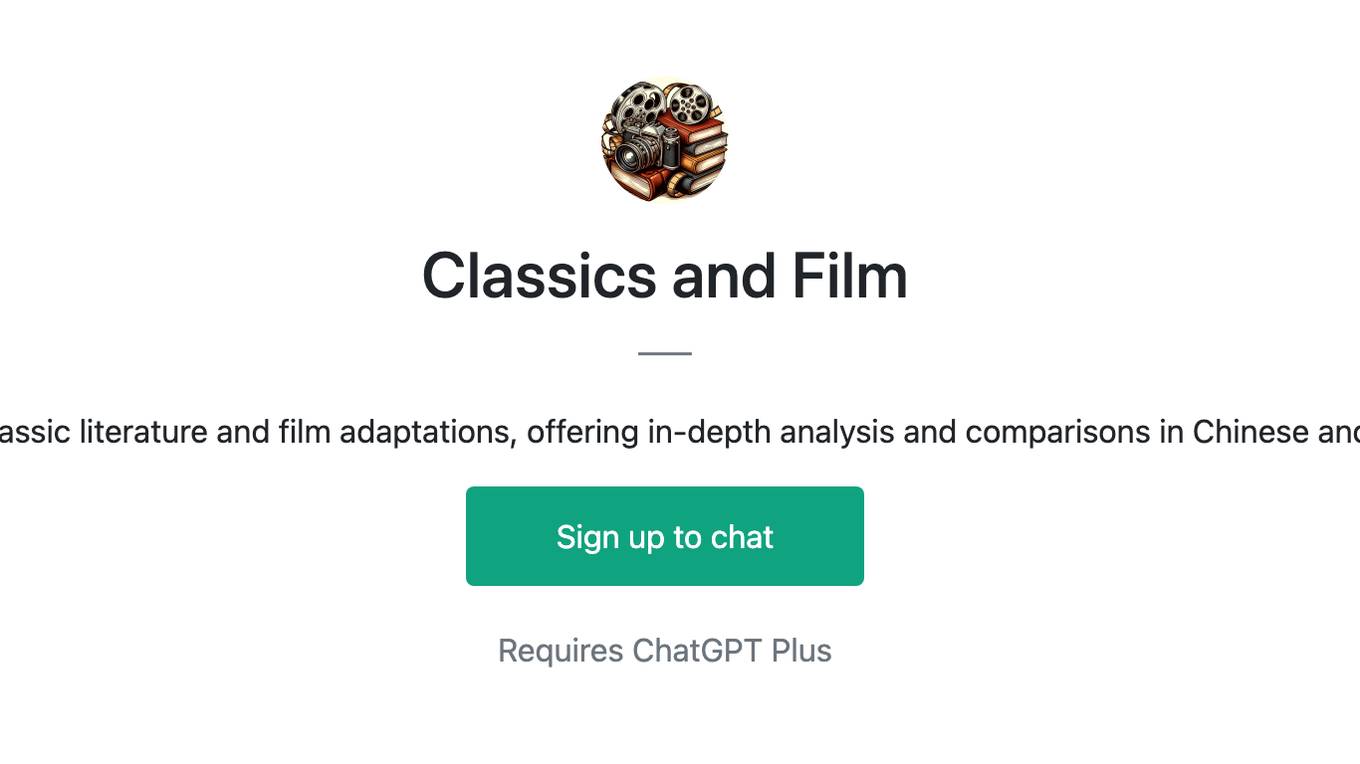
Classics and Film
Expert in classic literature and film adaptations, offering in-depth analysis and comparisons in Chinese and English.
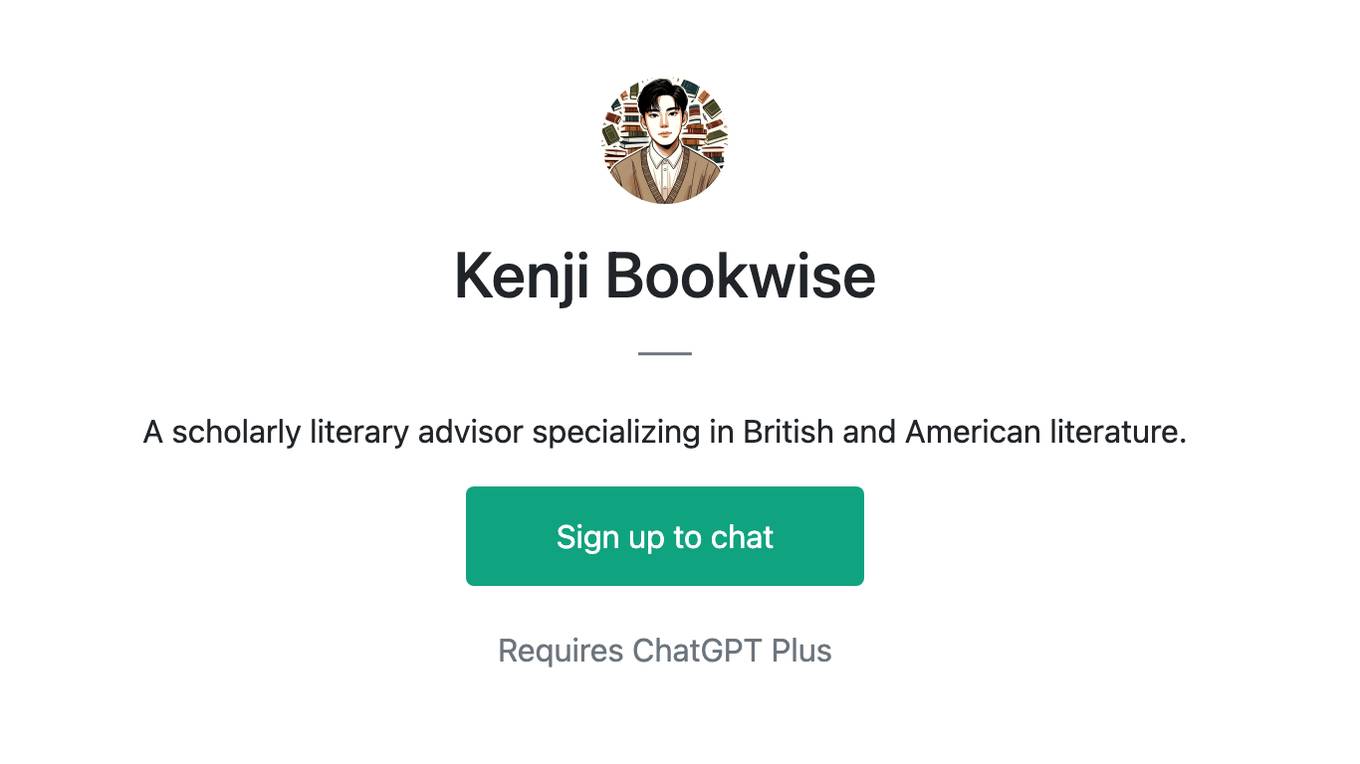
Kenji Bookwise
A scholarly literary advisor specializing in British and American literature.
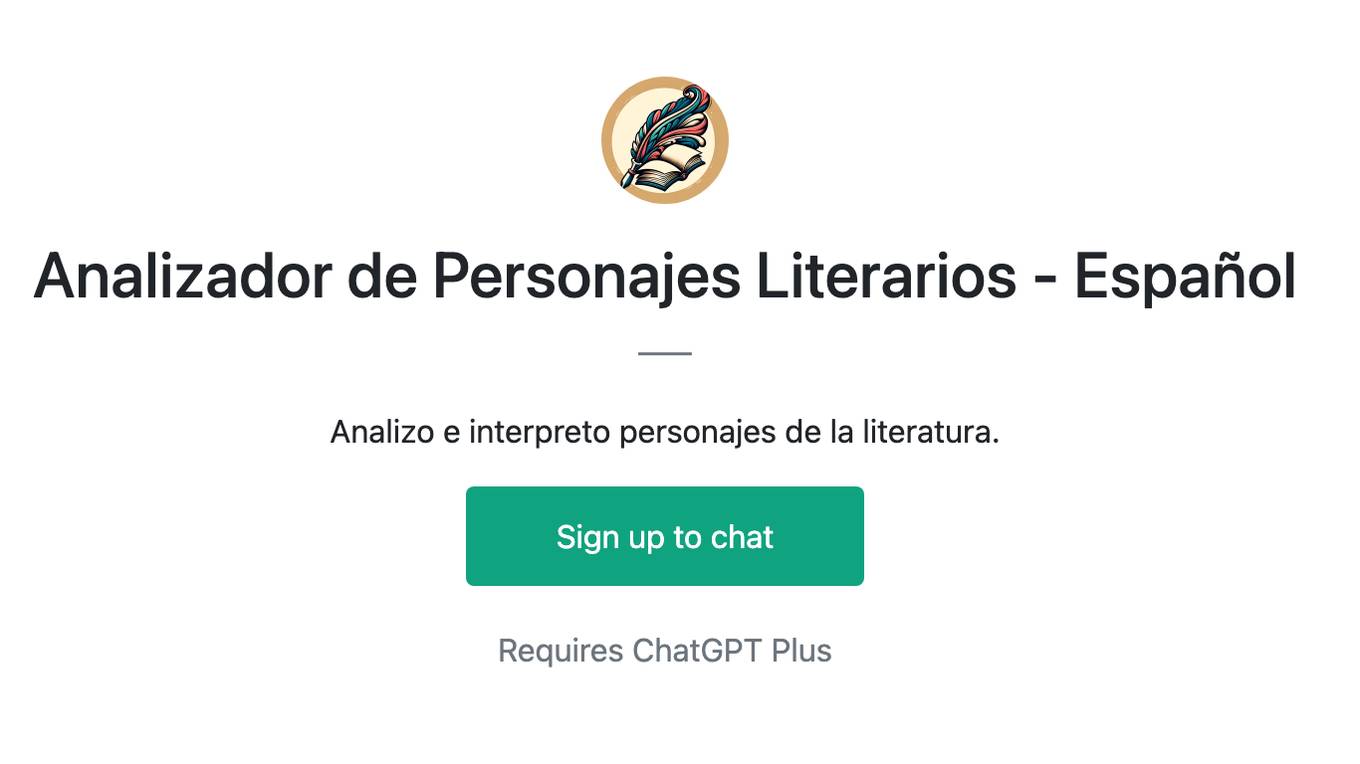
Analizador de Personajes Literarios - Español
Analizo e interpreto personajes de la literatura.
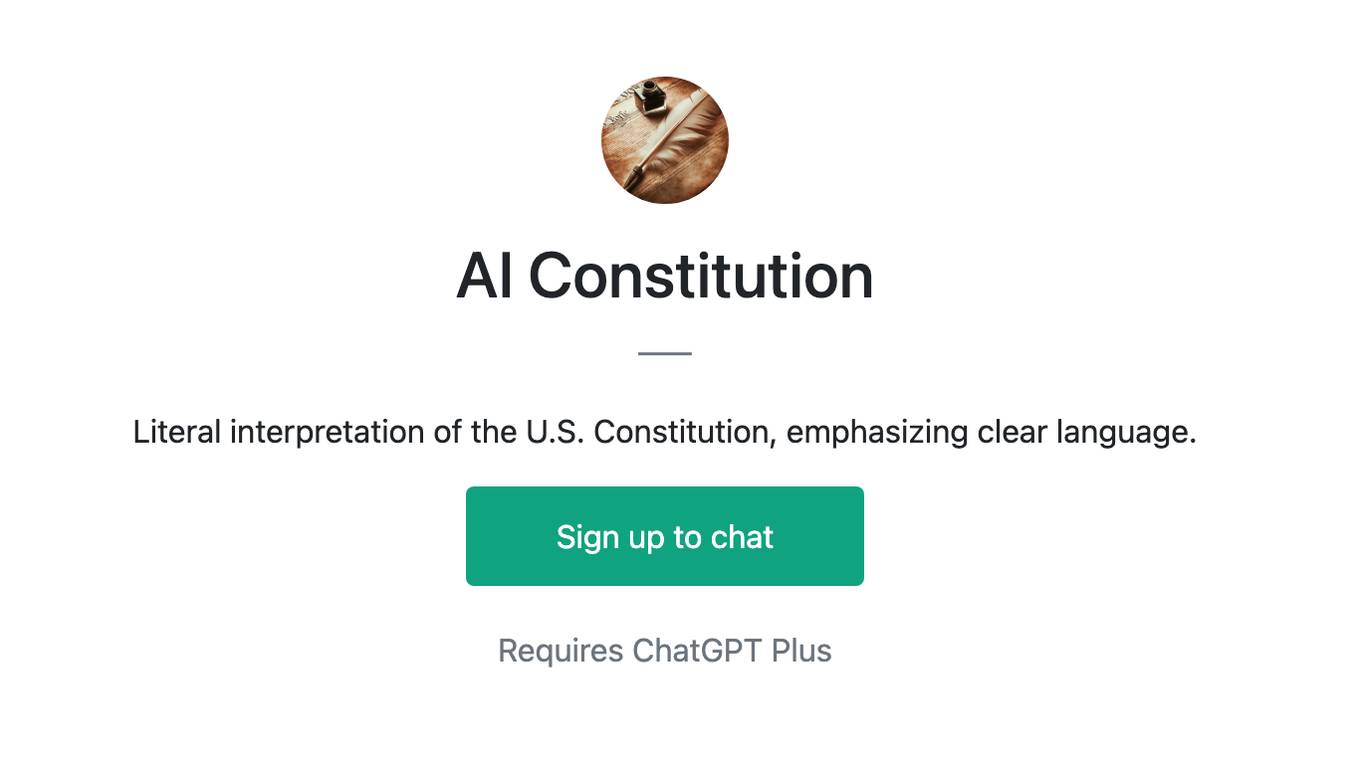
AI Constitution
Literal interpretation of the U.S. Constitution, emphasizing clear language.
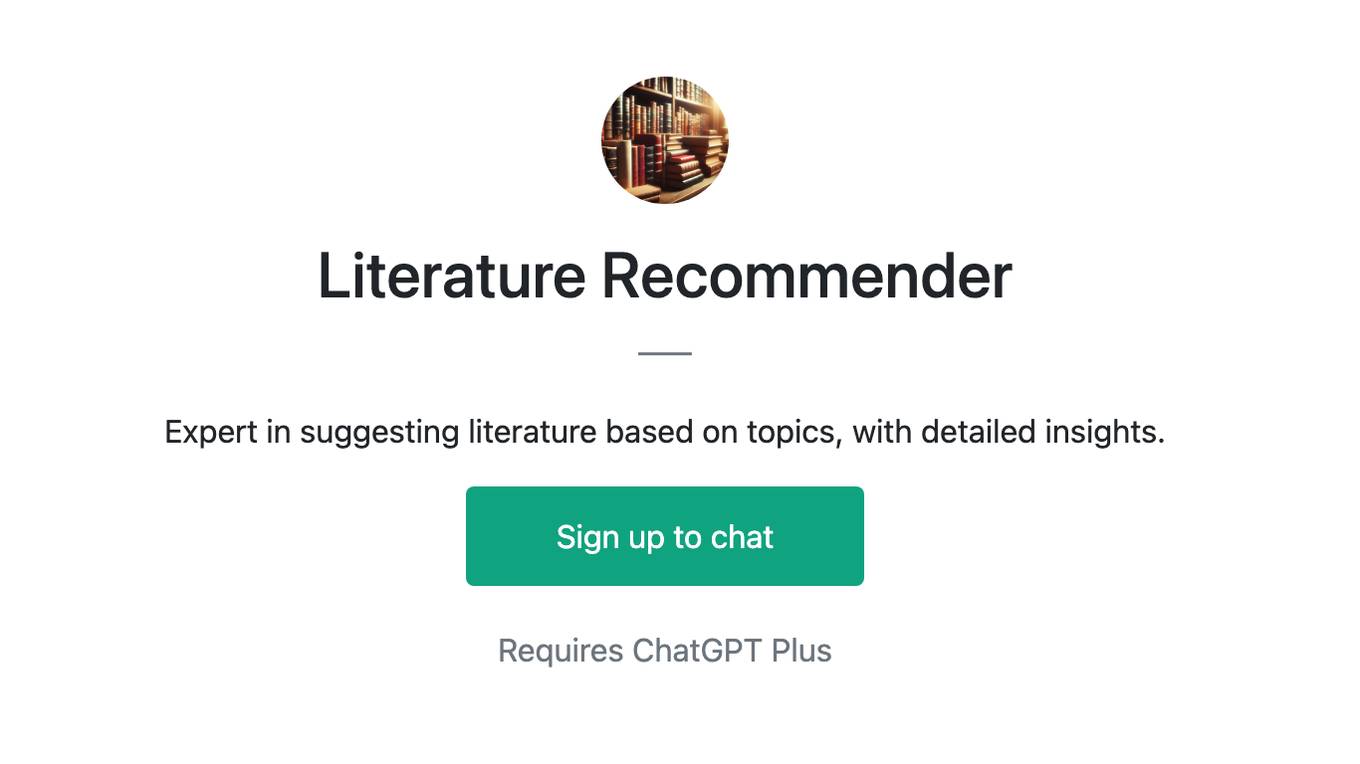
Literature Recommender
Expert in suggesting literature based on topics, with detailed insights.
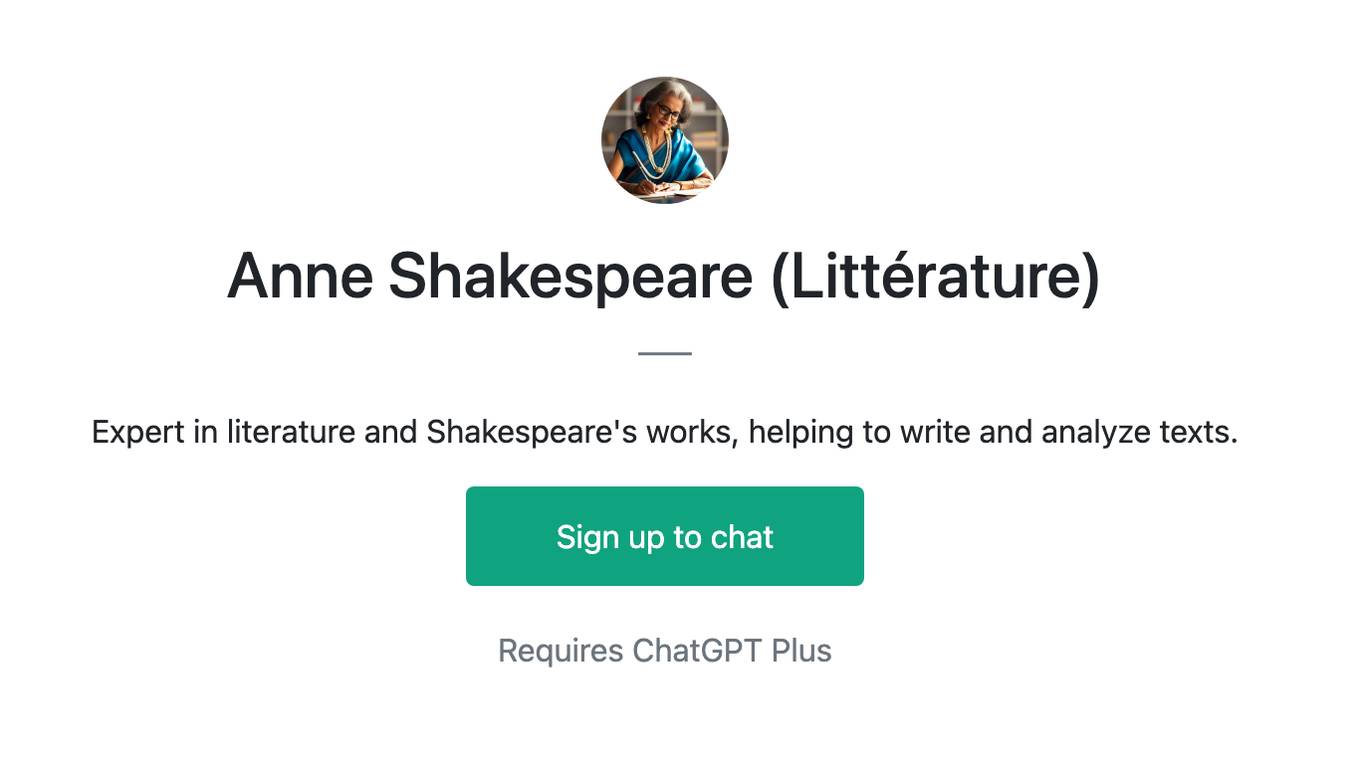
Anne Shakespeare (Littérature)
Expert in literature and Shakespeare's works, helping to write and analyze texts.
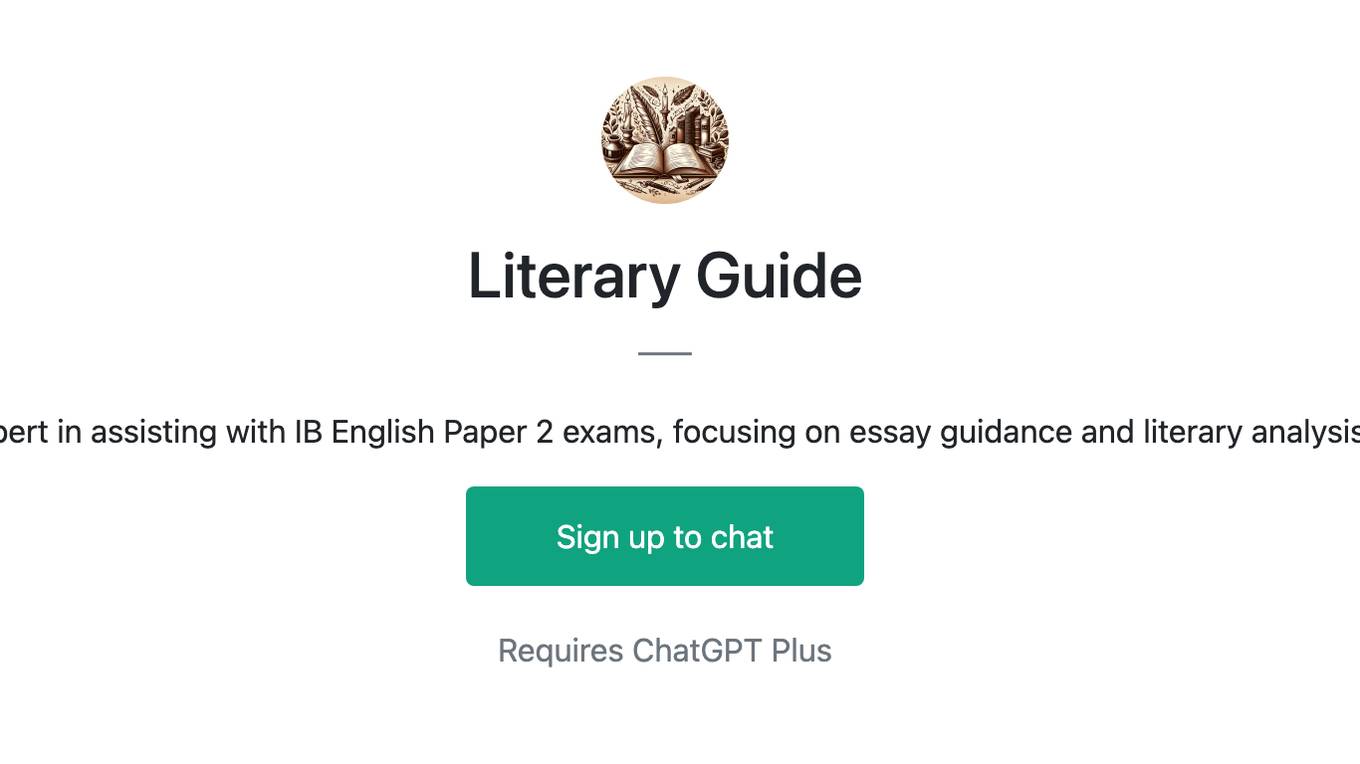
Literary Guide
Expert in assisting with IB English Paper 2 exams, focusing on essay guidance and literary analysis.
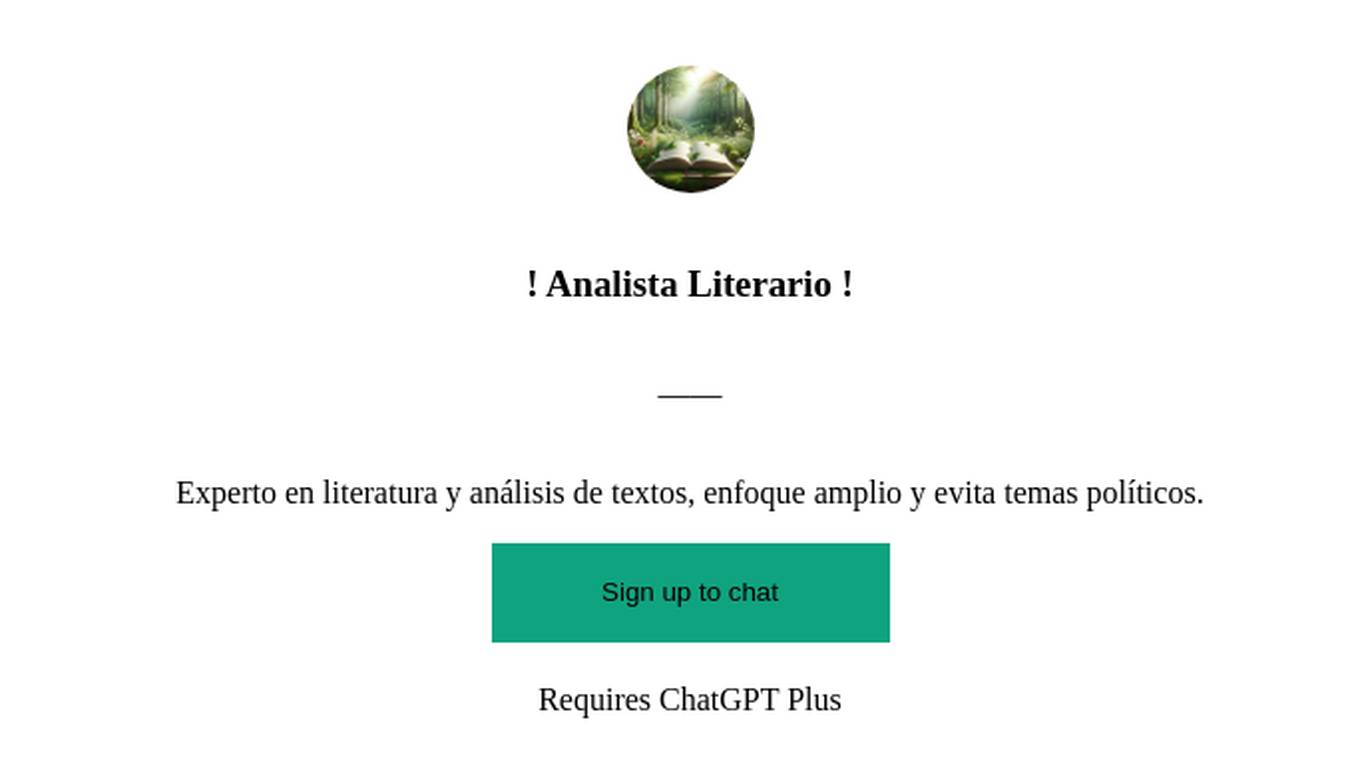
! Analista Literario !
Experto en literatura y análisis de textos, enfoque amplio y evita temas políticos.
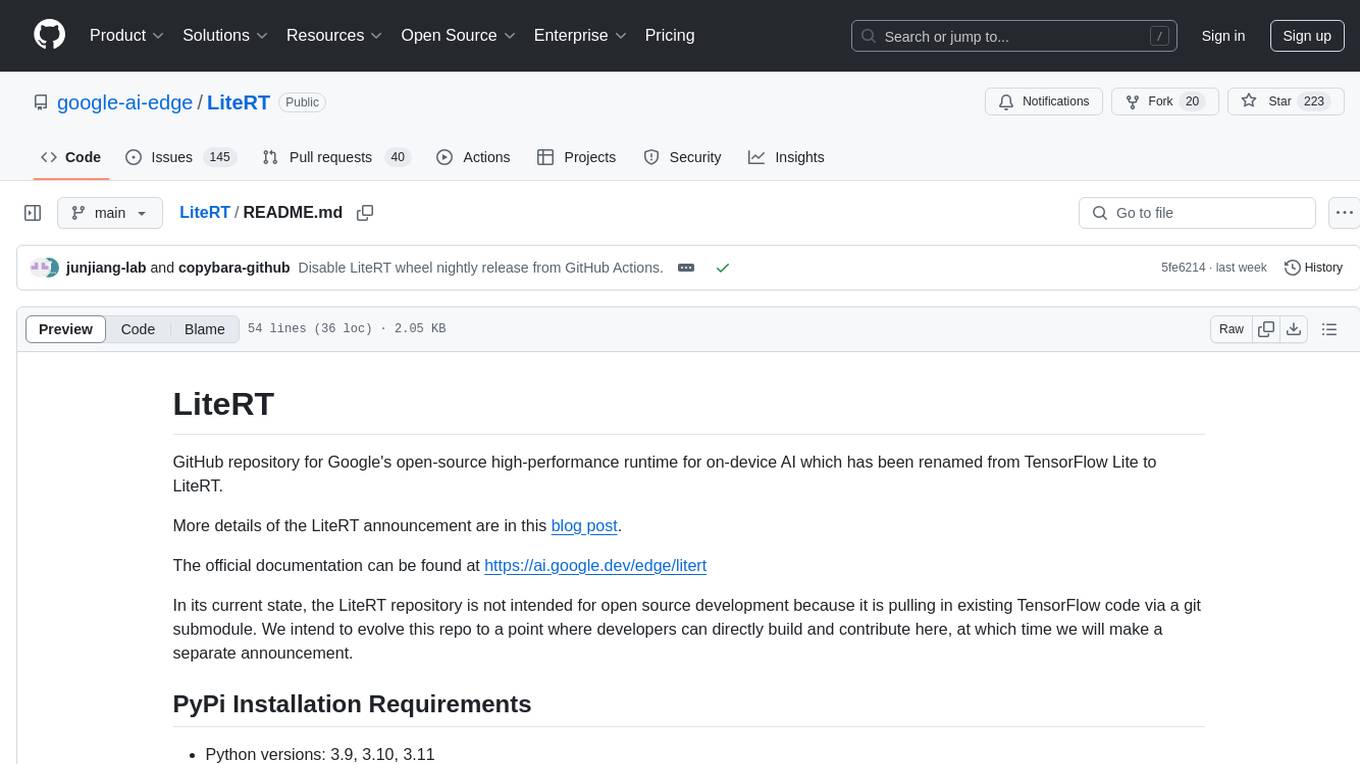
LiteRT
LiteRT is Google's open-source high-performance runtime for on-device AI, previously known as TensorFlow Lite. The repository is currently not intended for open-source development, but aims to evolve to allow direct building and contributions. LiteRT supports Python versions 3.9, 3.10, 3.11 on Linux and MacOS. It ensures compatibility with existing .tflite file extension and format, offering conversion tools and continued active development under the name LiteRT.
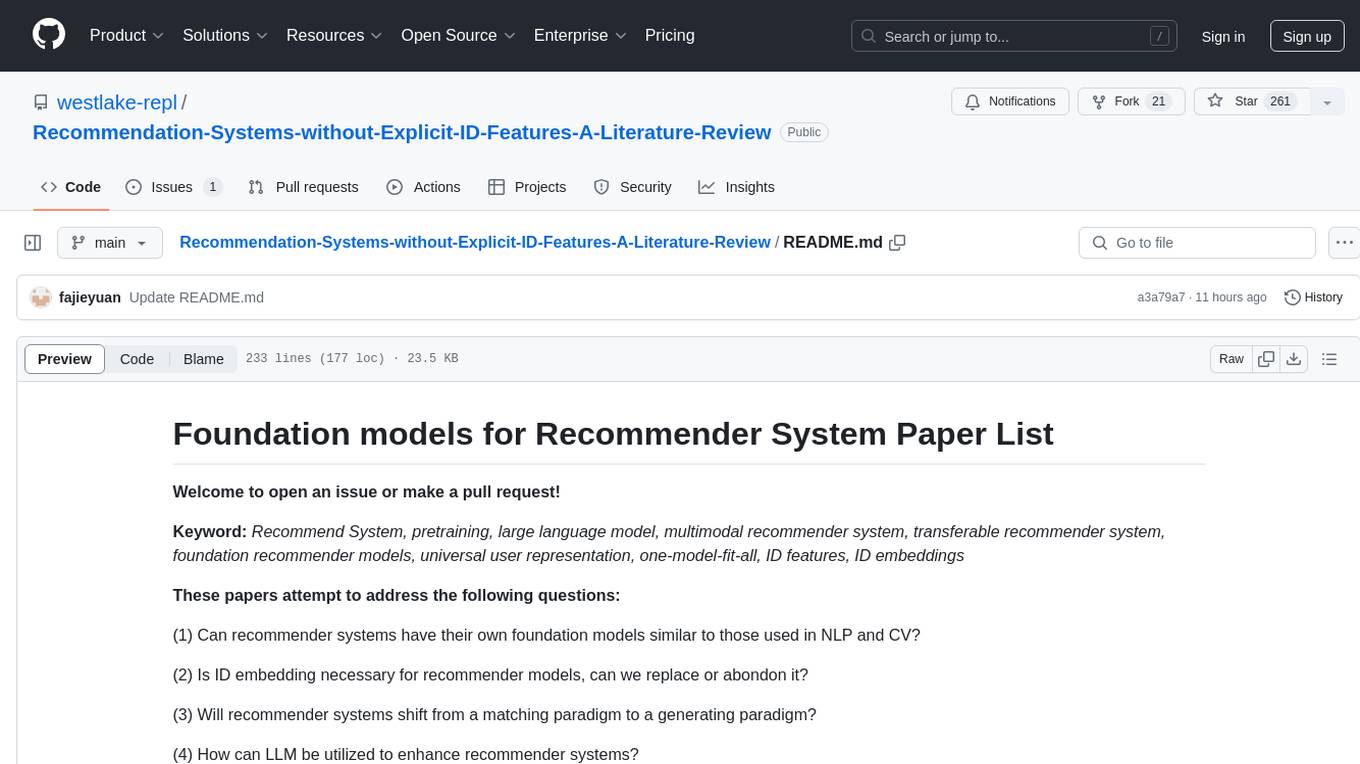
Recommendation-Systems-without-Explicit-ID-Features-A-Literature-Review
This repository is a collection of papers and resources related to recommendation systems, focusing on foundation models, transferable recommender systems, large language models, and multimodal recommender systems. It explores questions such as the necessity of ID embeddings, the shift from matching to generating paradigms, and the future of multimodal recommender systems. The papers cover various aspects of recommendation systems, including pretraining, user representation, dataset benchmarks, and evaluation methods. The repository aims to provide insights and advancements in the field of recommendation systems through literature reviews, surveys, and empirical studies.
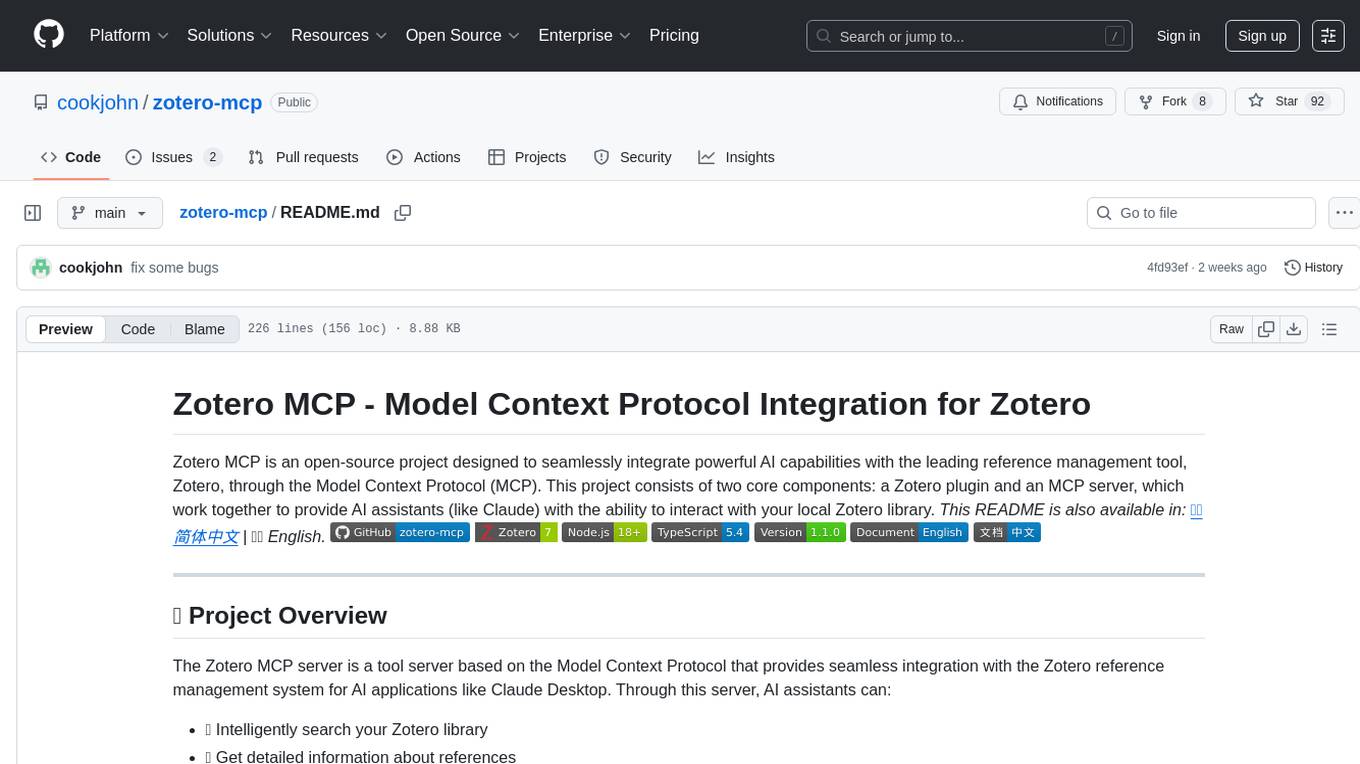
zotero-mcp
Zotero MCP is an open-source project that integrates AI capabilities with Zotero using the Model Context Protocol. It consists of a Zotero plugin and an MCP server, enabling AI assistants to search, retrieve, and cite references from Zotero library. The project features a unified architecture with an integrated MCP server, eliminating the need for a separate server process. It provides features like intelligent search, detailed reference information, filtering by tags and identifiers, aiding in academic tasks such as literature reviews and citation management.
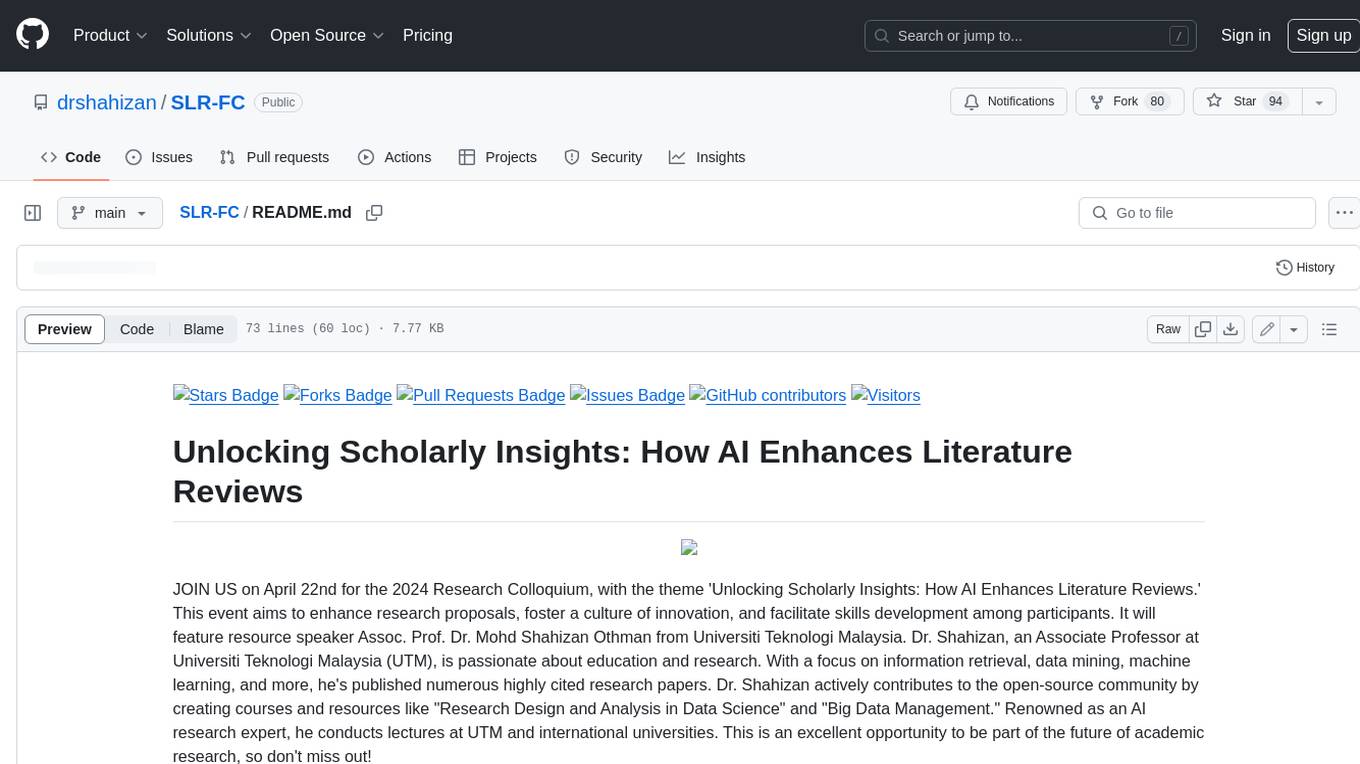
SLR-FC
This repository provides a comprehensive collection of AI tools and resources to enhance literature reviews. It includes a curated list of AI tools for various tasks, such as identifying research gaps, discovering relevant papers, visualizing paper content, and summarizing text. Additionally, the repository offers materials on generative AI, effective prompts, copywriting, image creation, and showcases of AI capabilities. By leveraging these tools and resources, researchers can streamline their literature review process, gain deeper insights from scholarly literature, and improve the quality of their research outputs.
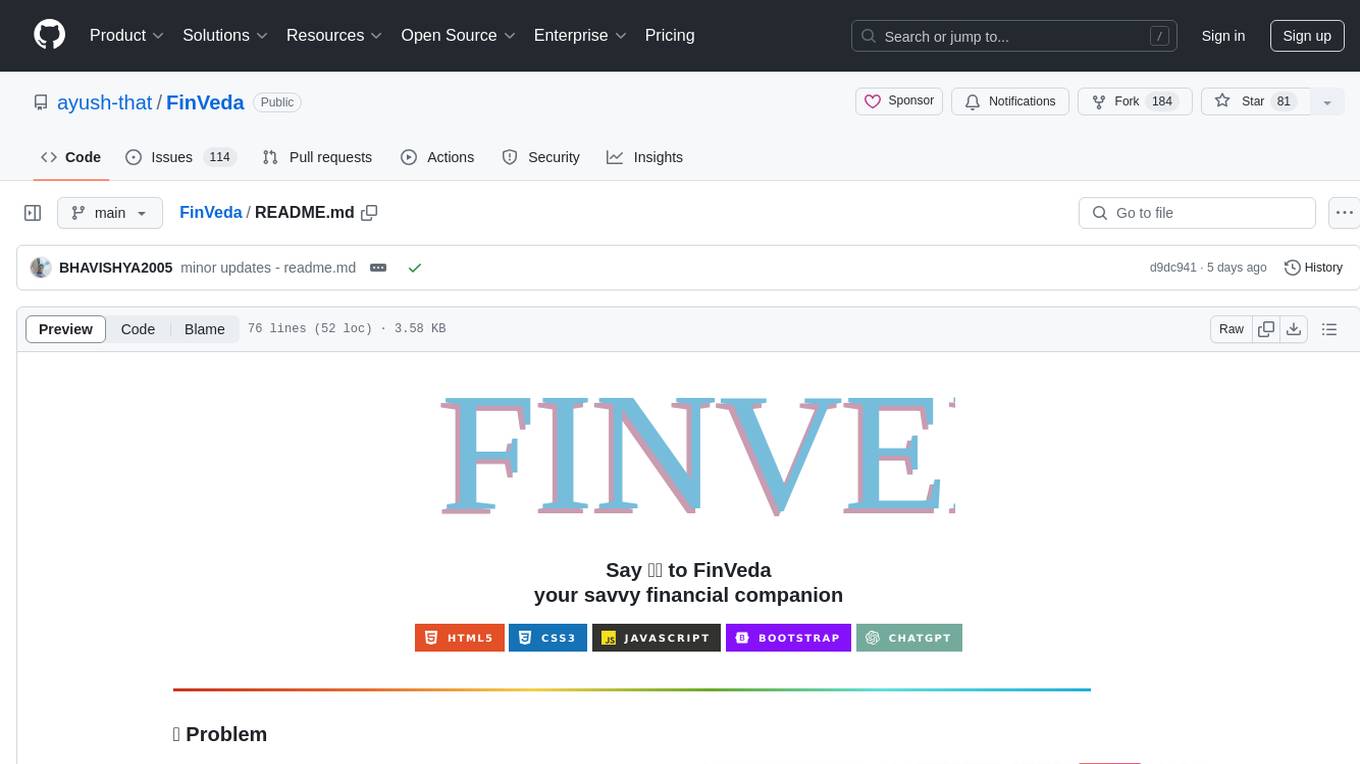
FinVeda
FinVeda is a dynamic financial literacy app that aims to solve the problem of low financial literacy rates in India by providing a platform for financial education. It features an AI chatbot, finance blogs, market trends analysis, SIP calculator, and finance quiz to help users learn finance with finesse. The app is free and open-source, licensed under the GNU General Public License v3.0. FinVeda was developed at IIT Jammu's Udyamitsav'24 Hackathon, where it won first place in the GenAI track and third place overall.
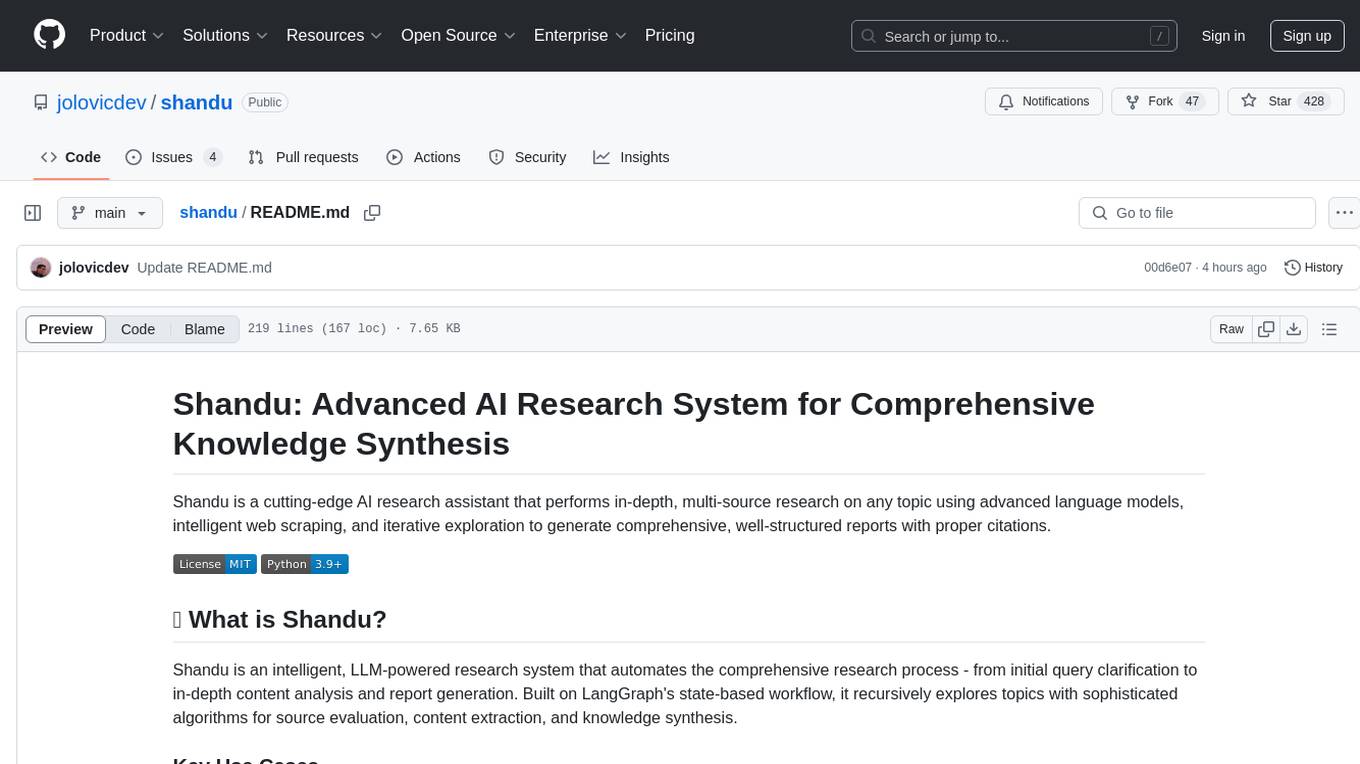
shandu
Shandu is an advanced AI research system that automates comprehensive research processes using language models, web scraping, and iterative exploration to generate well-structured reports with citations. It features intelligent state-based workflow, deep exploration, multi-source information synthesis, enhanced web scraping, smart source evaluation, content analysis pipeline, comprehensive report generation, parallel processing, adaptive search strategy, and full citation management.
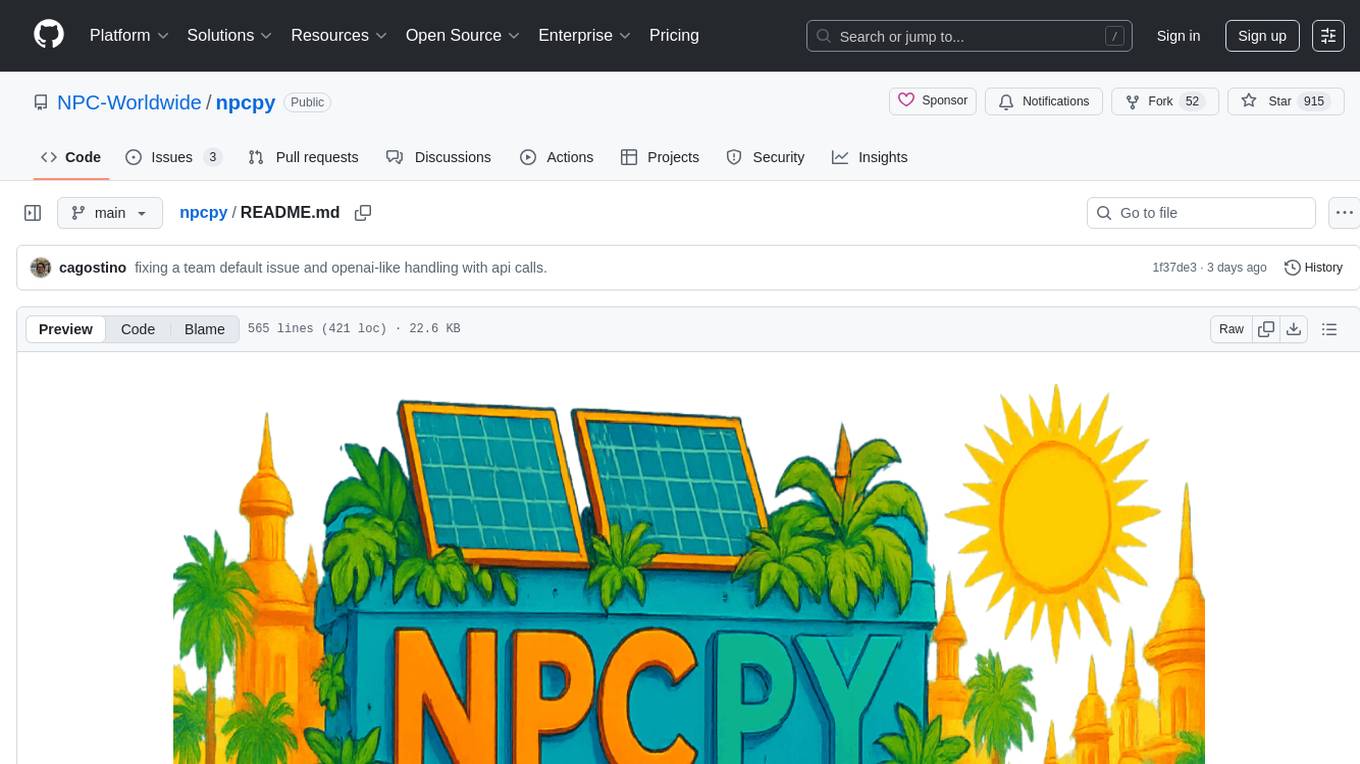
npcpy
npcpy is a core library of the NPC Toolkit that enhances natural language processing pipelines and agent tooling. It provides a flexible framework for building applications and conducting research with LLMs. The tool supports various functionalities such as getting responses for agents, setting up agent teams, orchestrating jinx workflows, obtaining LLM responses, generating images, videos, audio, and more. It also includes a Flask server for deploying NPC teams, supports LiteLLM integration, and simplifies the development of NLP-based applications. The tool is versatile, supporting multiple models and providers, and offers a graphical user interface through NPC Studio and a command-line interface via NPC Shell.
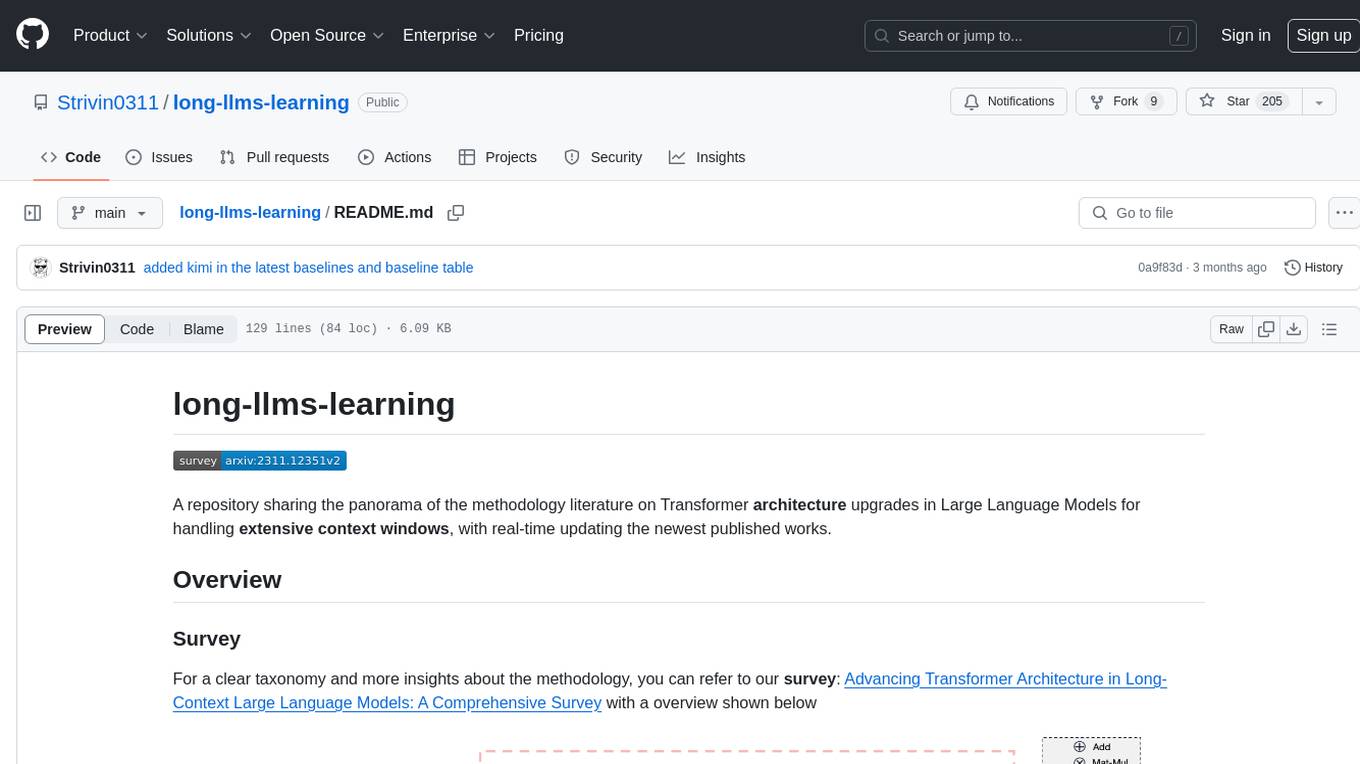
long-llms-learning
A repository sharing the panorama of the methodology literature on Transformer architecture upgrades in Large Language Models for handling extensive context windows, with real-time updating the newest published works. It includes a survey on advancing Transformer architecture in long-context large language models, flash-ReRoPE implementation, latest news on data engineering, lightning attention, Kimi AI assistant, chatglm-6b-128k, gpt-4-turbo-preview, benchmarks like InfiniteBench and LongBench, long-LLMs-evals for evaluating methods for enhancing long-context capabilities, and LLMs-learning for learning technologies and applicated tasks about Large Language Models.
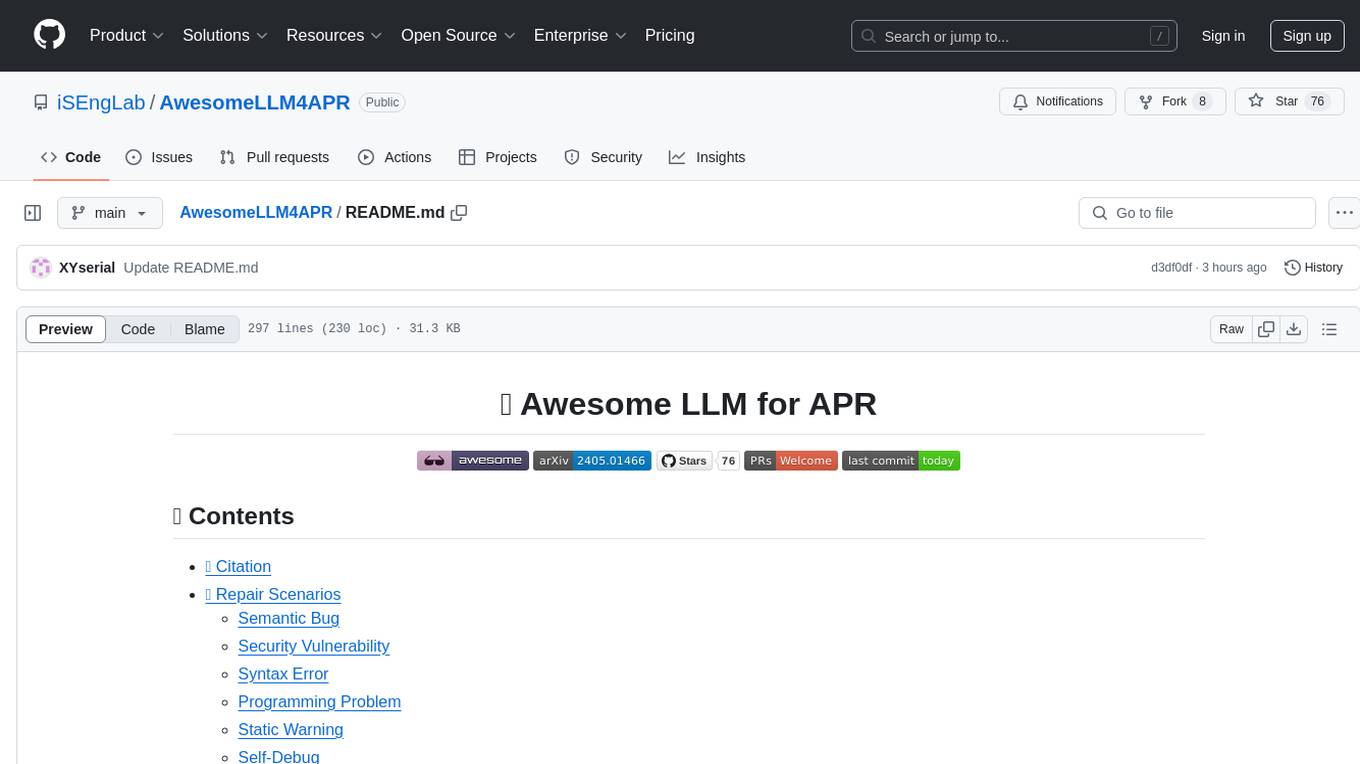
AwesomeLLM4APR
Awesome LLM for APR is a repository dedicated to exploring the capabilities of Large Language Models (LLMs) in Automated Program Repair (APR). It provides a comprehensive collection of research papers, tools, and resources related to using LLMs for various scenarios such as repairing semantic bugs, security vulnerabilities, syntax errors, programming problems, static warnings, self-debugging, type errors, web UI tests, smart contracts, hardware bugs, performance bugs, API misuses, crash bugs, test case repairs, formal proofs, GitHub issues, code reviews, motion planners, human studies, and patch correctness assessments. The repository serves as a valuable reference for researchers and practitioners interested in leveraging LLMs for automated program repair.
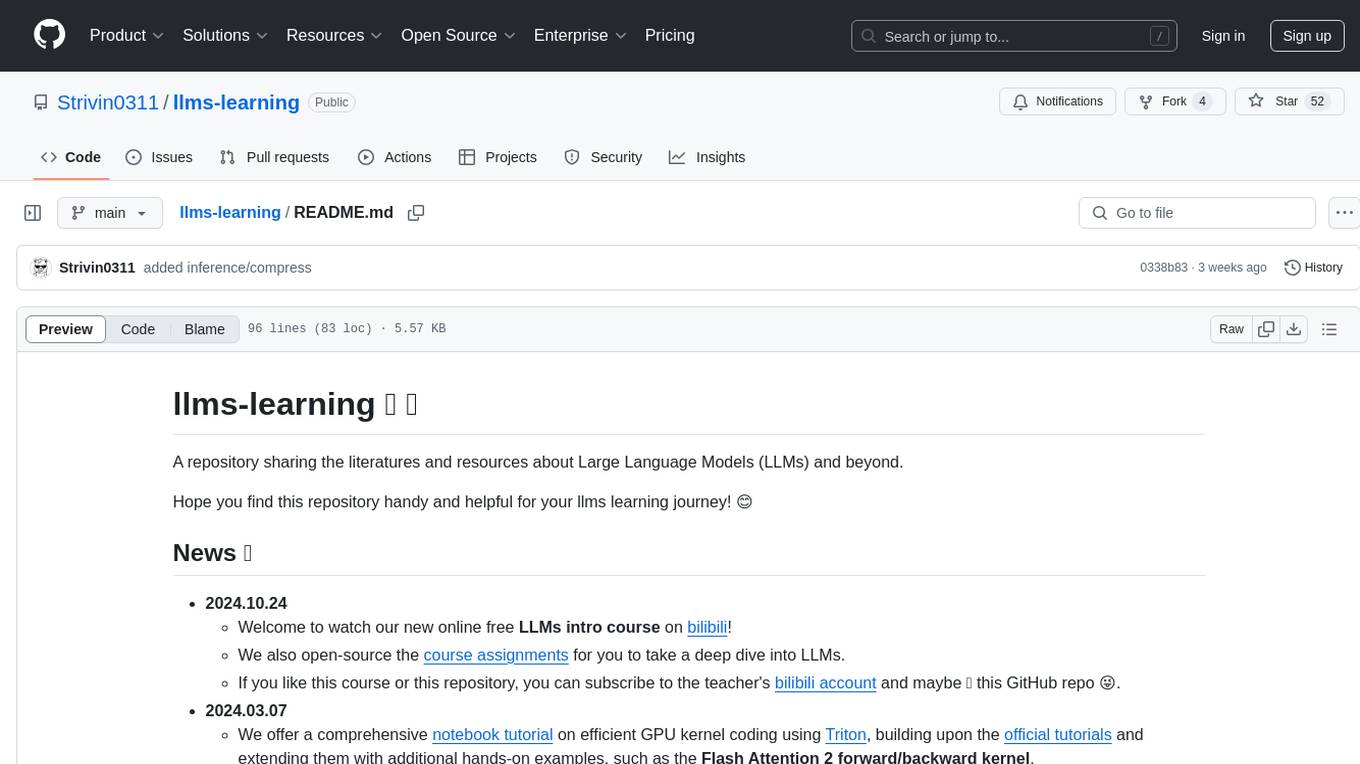
llms-learning
A repository sharing literatures and resources about Large Language Models (LLMs) and beyond. It includes tutorials, notebooks, course assignments, development stages, modeling, inference, training, applications, study, and basics related to LLMs. The repository covers various topics such as language models, transformers, state space models, multi-modal language models, training recipes, applications in autonomous driving, code, math, embodied intelligence, and more. The content is organized by different categories and provides comprehensive information on LLMs and related topics.
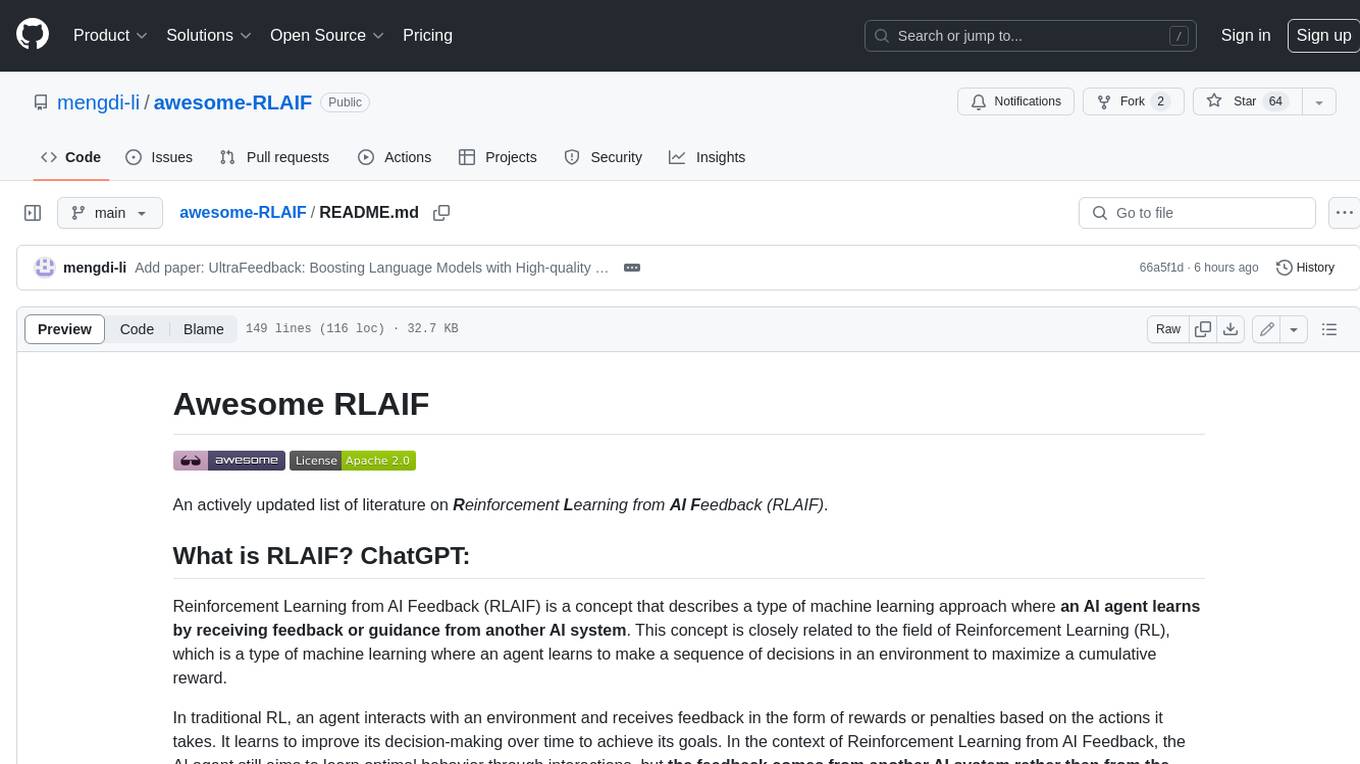
awesome-RLAIF
Reinforcement Learning from AI Feedback (RLAIF) is a concept that describes a type of machine learning approach where **an AI agent learns by receiving feedback or guidance from another AI system**. This concept is closely related to the field of Reinforcement Learning (RL), which is a type of machine learning where an agent learns to make a sequence of decisions in an environment to maximize a cumulative reward. In traditional RL, an agent interacts with an environment and receives feedback in the form of rewards or penalties based on the actions it takes. It learns to improve its decision-making over time to achieve its goals. In the context of Reinforcement Learning from AI Feedback, the AI agent still aims to learn optimal behavior through interactions, but **the feedback comes from another AI system rather than from the environment or human evaluators**. This can be **particularly useful in situations where it may be challenging to define clear reward functions or when it is more efficient to use another AI system to provide guidance**. The feedback from the AI system can take various forms, such as: - **Demonstrations** : The AI system provides demonstrations of desired behavior, and the learning agent tries to imitate these demonstrations. - **Comparison Data** : The AI system ranks or compares different actions taken by the learning agent, helping it to understand which actions are better or worse. - **Reward Shaping** : The AI system provides additional reward signals to guide the learning agent's behavior, supplementing the rewards from the environment. This approach is often used in scenarios where the RL agent needs to learn from **limited human or expert feedback or when the reward signal from the environment is sparse or unclear**. It can also be used to **accelerate the learning process and make RL more sample-efficient**. Reinforcement Learning from AI Feedback is an area of ongoing research and has applications in various domains, including robotics, autonomous vehicles, and game playing, among others.

LLM4SE
The collection is actively updated with the help of an internal literature search engine.
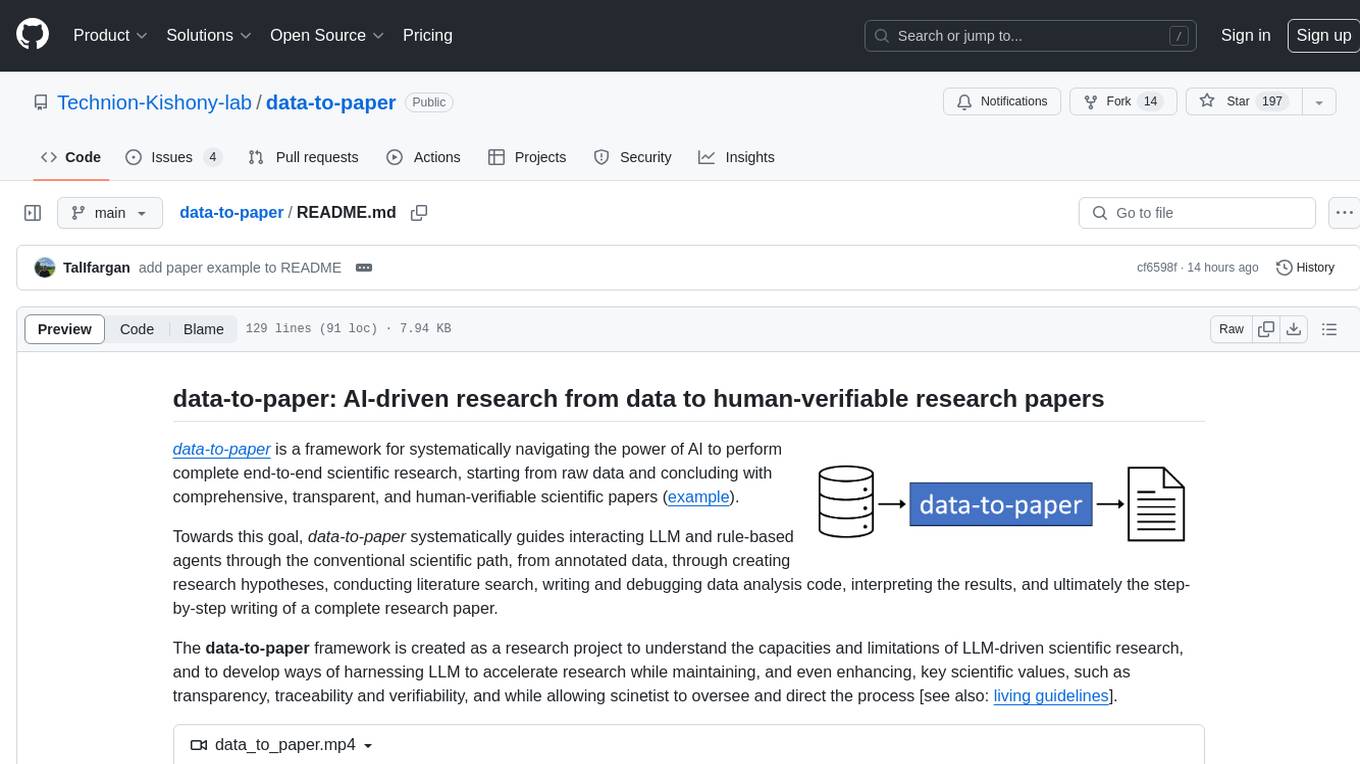
data-to-paper
Data-to-paper is an AI-driven framework designed to guide users through the process of conducting end-to-end scientific research, starting from raw data to the creation of comprehensive and human-verifiable research papers. The framework leverages a combination of LLM and rule-based agents to assist in tasks such as hypothesis generation, literature search, data analysis, result interpretation, and paper writing. It aims to accelerate research while maintaining key scientific values like transparency, traceability, and verifiability. The framework is field-agnostic, supports both open-goal and fixed-goal research, creates data-chained manuscripts, involves human-in-the-loop interaction, and allows for transparent replay of the research process.
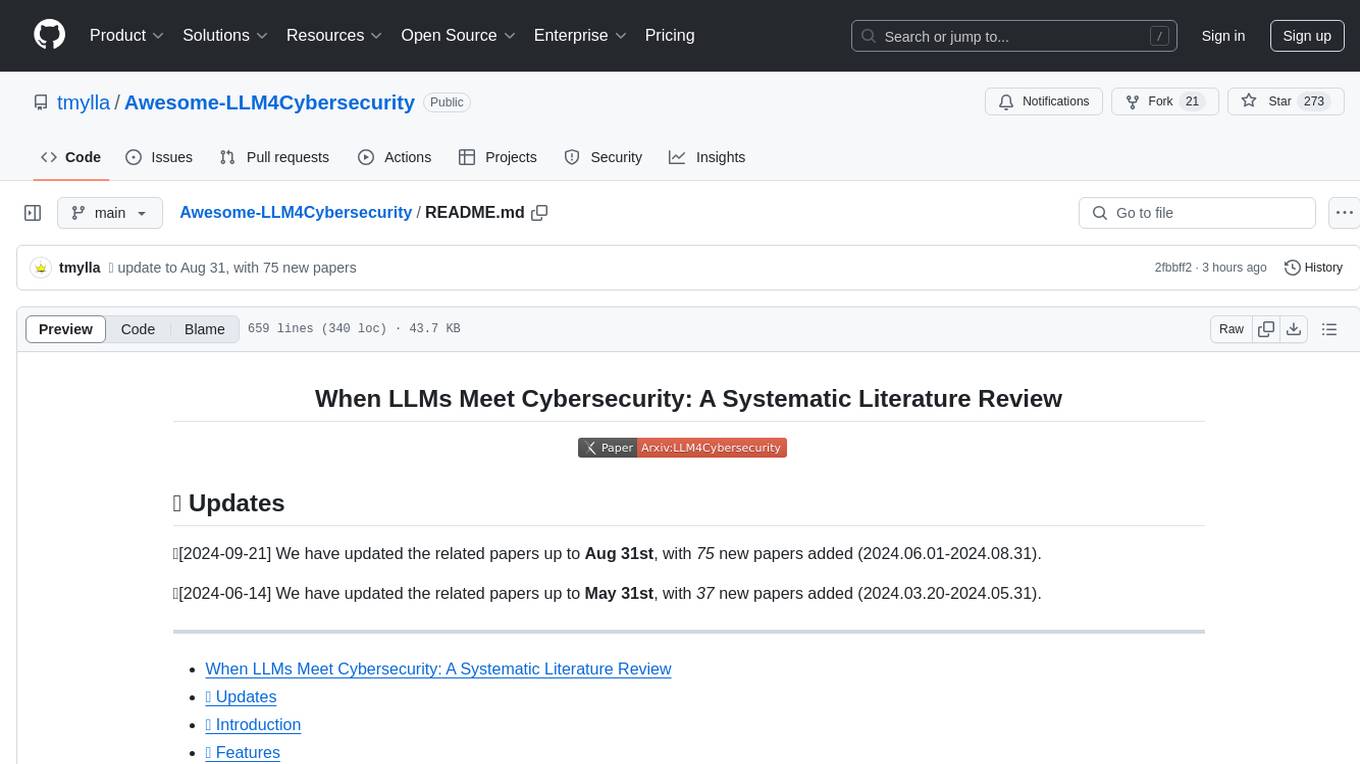
Awesome-LLM4Cybersecurity
The repository 'Awesome-LLM4Cybersecurity' provides a comprehensive overview of the applications of Large Language Models (LLMs) in cybersecurity. It includes a systematic literature review covering topics such as constructing cybersecurity-oriented domain LLMs, potential applications of LLMs in cybersecurity, and research directions in the field. The repository analyzes various benchmarks, datasets, and applications of LLMs in cybersecurity tasks like threat intelligence, fuzzing, vulnerabilities detection, insecure code generation, program repair, anomaly detection, and LLM-assisted attacks.
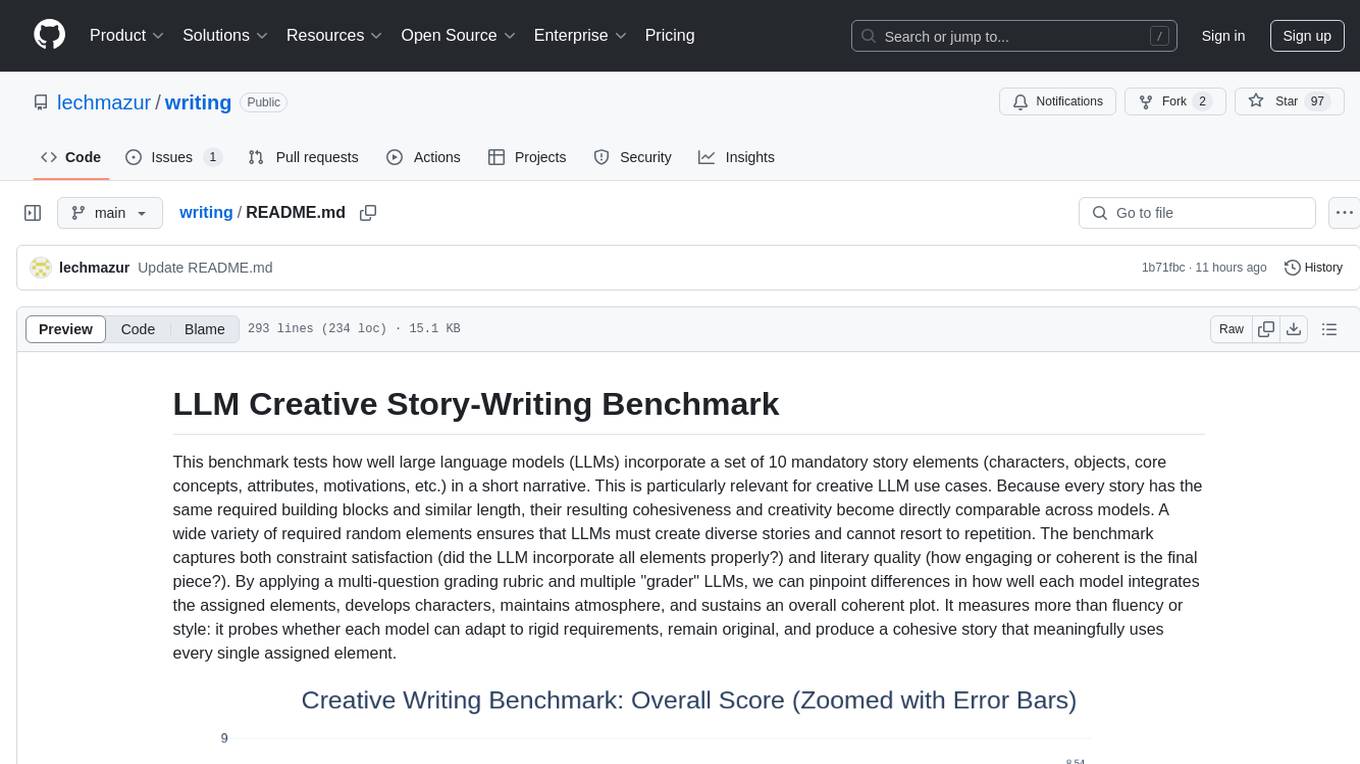
writing
The LLM Creative Story-Writing Benchmark evaluates large language models based on their ability to incorporate a set of 10 mandatory story elements in a short narrative. It measures constraint satisfaction and literary quality by grading models on character development, plot structure, atmosphere, storytelling impact, authenticity, and execution. The benchmark aims to assess how well models can adapt to rigid requirements, remain original, and produce cohesive stories using all assigned elements.
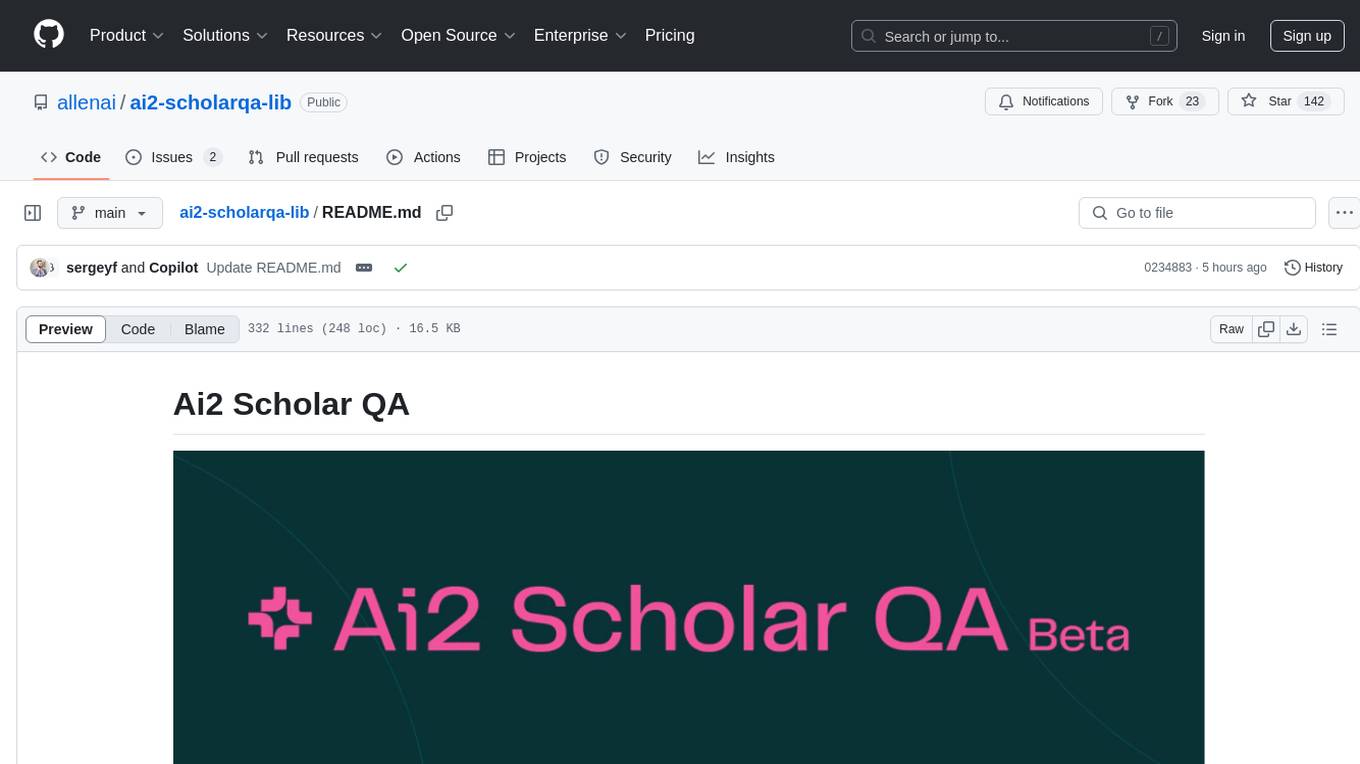
ai2-scholarqa-lib
Ai2 Scholar QA is a system for answering scientific queries and literature review by gathering evidence from multiple documents across a corpus and synthesizing an organized report with evidence for each claim. It consists of a retrieval component and a three-step generator pipeline. The retrieval component fetches relevant evidence passages using the Semantic Scholar public API and reranks them. The generator pipeline includes quote extraction, planning and clustering, and summary generation. The system is powered by the ScholarQA class, which includes components like PaperFinder and MultiStepQAPipeline. It requires environment variables for Semantic Scholar API and LLMs, and can be run as local docker containers or embedded into another application as a Python package.
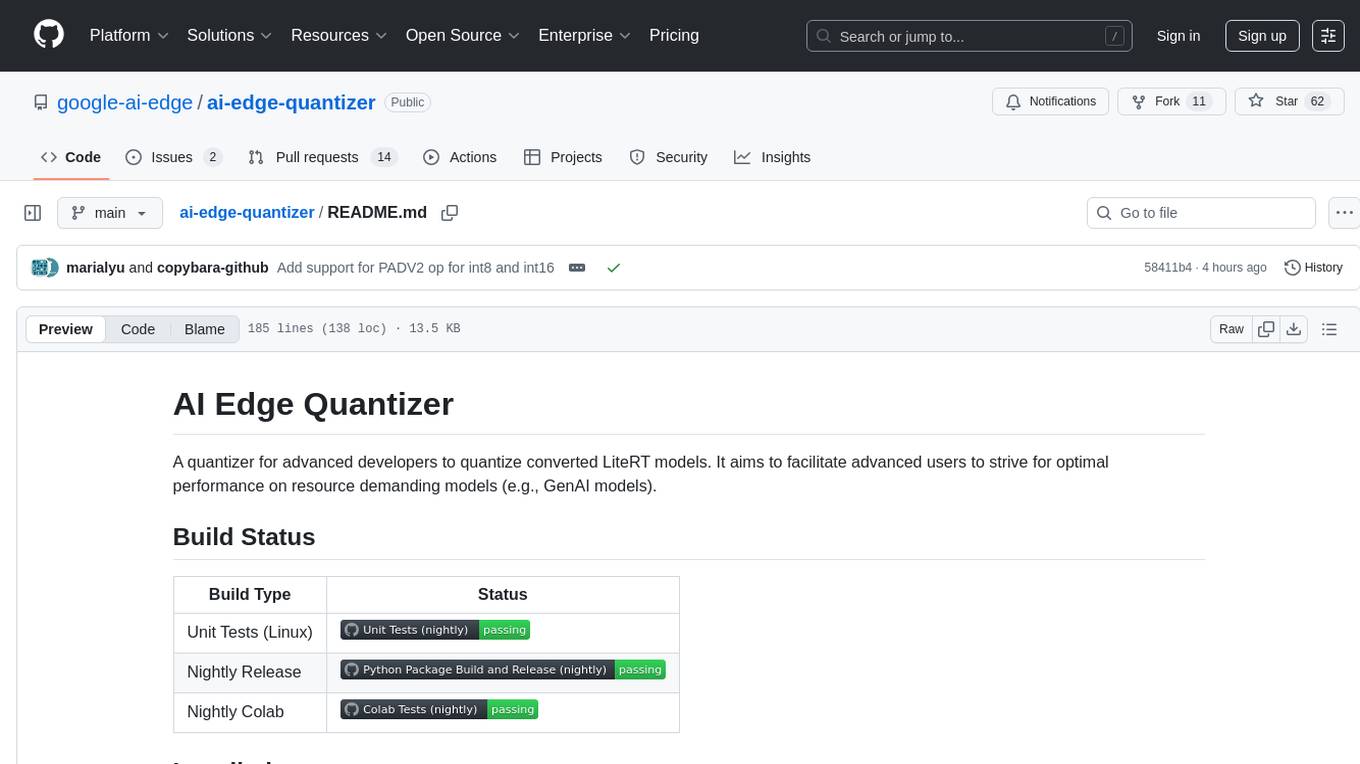
ai-edge-quantizer
AI Edge Quantizer is a tool designed for advanced developers to quantize converted LiteRT models. It aims to optimize performance on resource-demanding models by providing quantization recipes for edge device deployment. The tool supports dynamic quantization, weight-only quantization, and static quantization methods, allowing users to customize the quantization process for different hardware deployments. Users can specify quantization recipes to apply to source models, resulting in quantized LiteRT models ready for deployment. The tool also includes advanced features such as selective quantization and mixed precision schemes for fine-tuning quantization recipes.
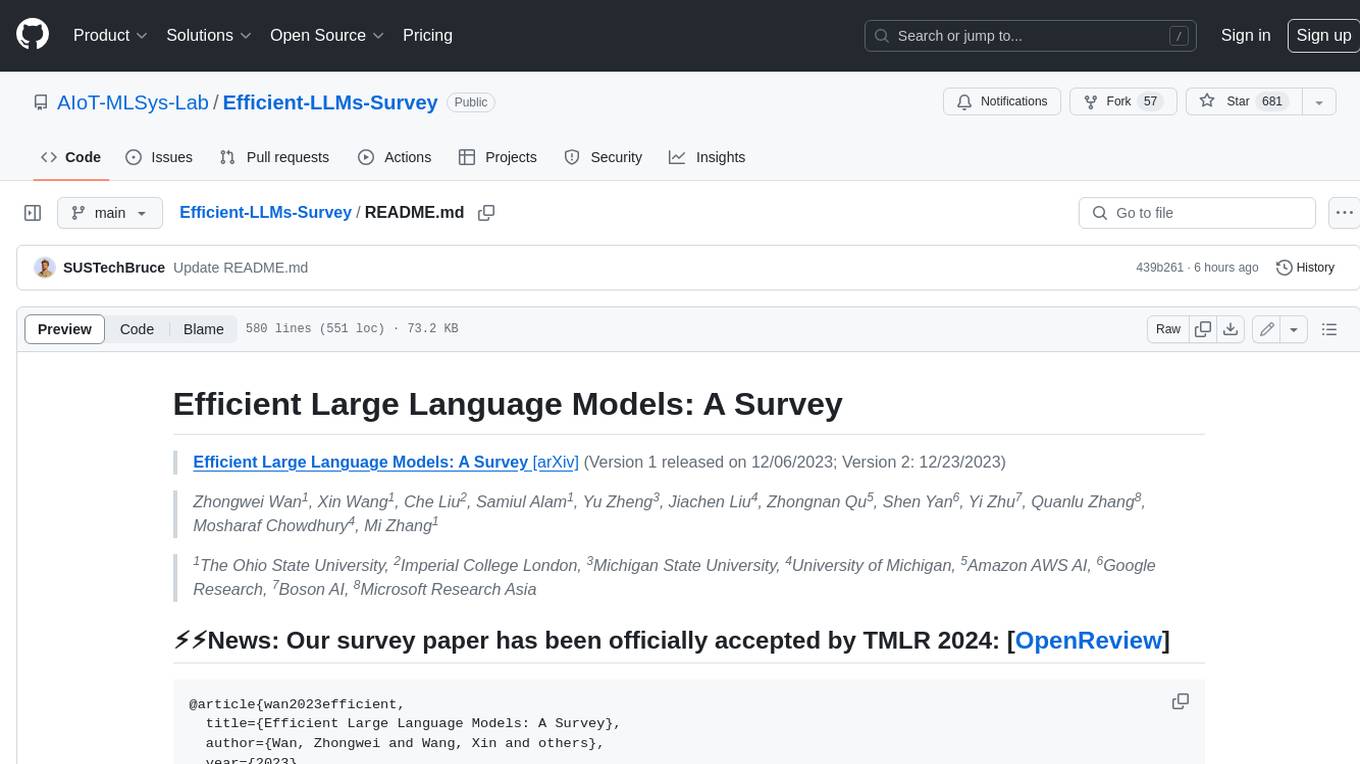
Efficient-LLMs-Survey
This repository provides a systematic and comprehensive review of efficient LLMs research. We organize the literature in a taxonomy consisting of three main categories, covering distinct yet interconnected efficient LLMs topics from **model-centric** , **data-centric** , and **framework-centric** perspective, respectively. We hope our survey and this GitHub repository can serve as valuable resources to help researchers and practitioners gain a systematic understanding of the research developments in efficient LLMs and inspire them to contribute to this important and exciting field.
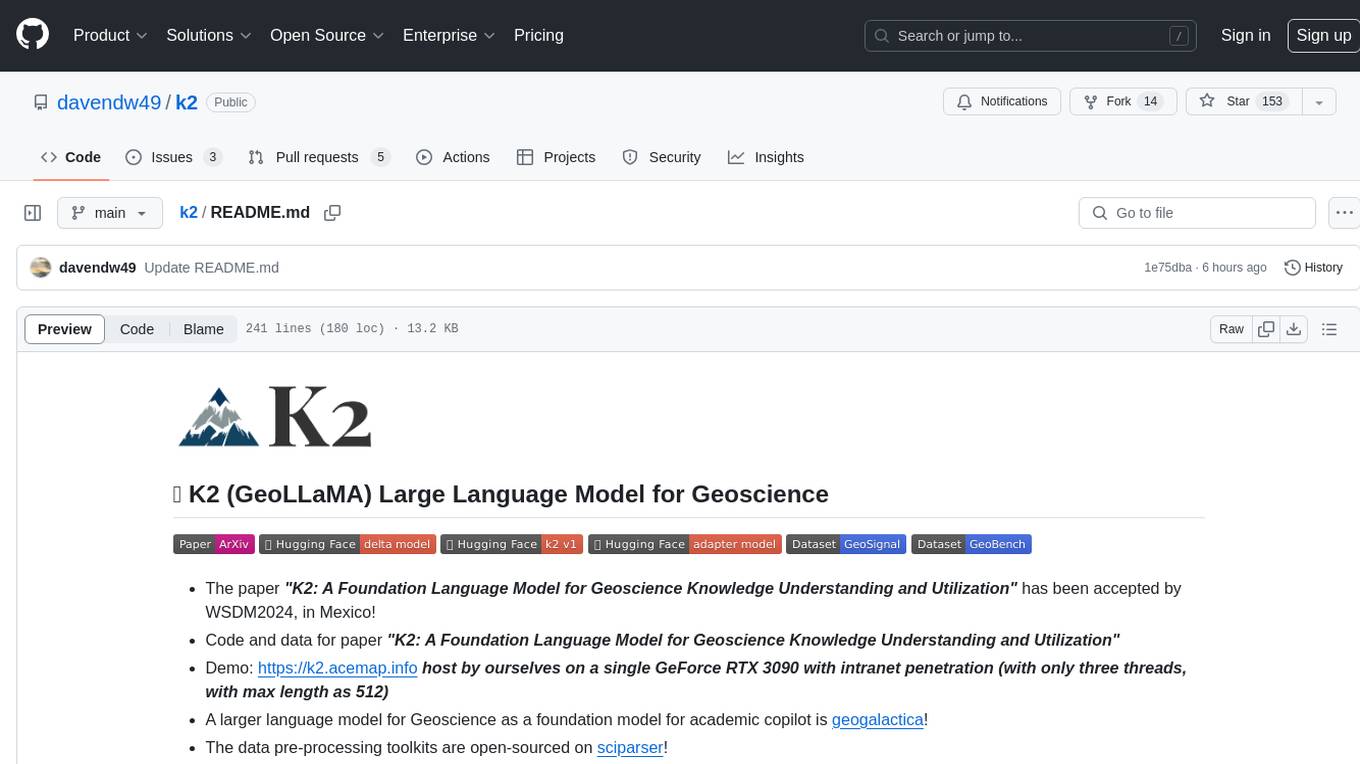
k2
K2 (GeoLLaMA) is a large language model for geoscience, trained on geoscience literature and fine-tuned with knowledge-intensive instruction data. It outperforms baseline models on objective and subjective tasks. The repository provides K2 weights, core data of GeoSignal, GeoBench benchmark, and code for further pretraining and instruction tuning. The model is available on Hugging Face for use. The project aims to create larger and more powerful geoscience language models in the future.
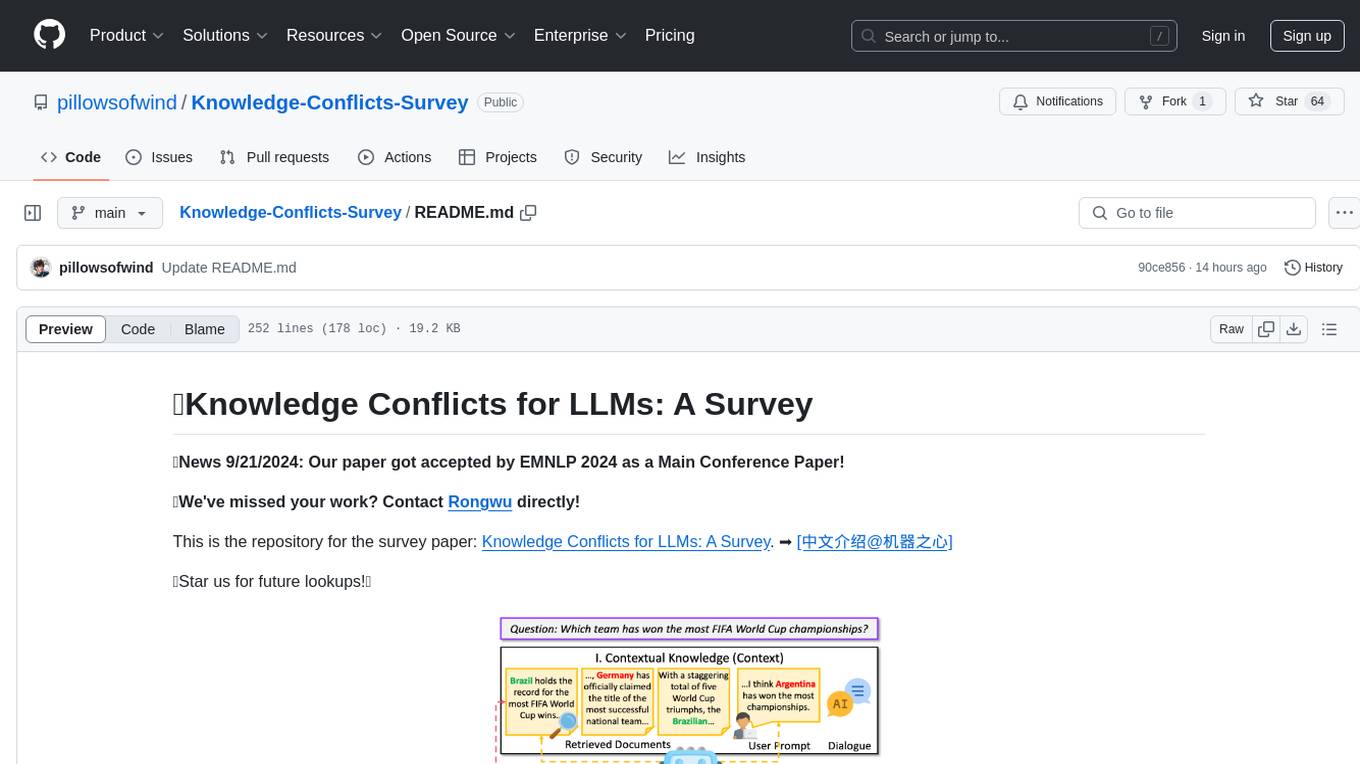
Knowledge-Conflicts-Survey
Knowledge Conflicts for LLMs: A Survey is a repository containing a survey paper that investigates three types of knowledge conflicts: context-memory conflict, inter-context conflict, and intra-memory conflict within Large Language Models (LLMs). The survey reviews the causes, behaviors, and possible solutions to these conflicts, providing a comprehensive analysis of the literature in this area. The repository includes detailed information on the types of conflicts, their causes, behavior analysis, and mitigating solutions, offering insights into how conflicting knowledge affects LLMs and how to address these conflicts.




